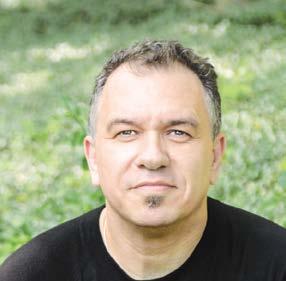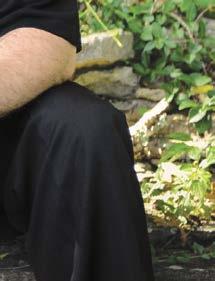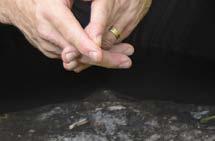ON THE NECESSITY OF REINVENTION
REVIEWS
AMERICANA MUSIC AWARDS

MICHAEL ALVEY

MITCHELL TENPENNY

ON THE NECESSITY OF REINVENTION
AMERICANA MUSIC AWARDS

MICHAEL ALVEY

MITCHELL TENPENNY
NOV. 3 ON ZOOM
OFFICIAL JOURNAL OF AFM LOCAL 257 OCTOBER - DECEMBER 2022
4 ANNOUNCEMENTS Details on the upcoming member meeting Nov. 3 on Zoom, including the proposals for 2023 annual dues, minutes and more.
6 STATE OF THE LOCAL Dave Pomeroy on the importance of passing the American Music Fairness Act, and voting “No” to TN Amendment 1 at the ballot box in November.
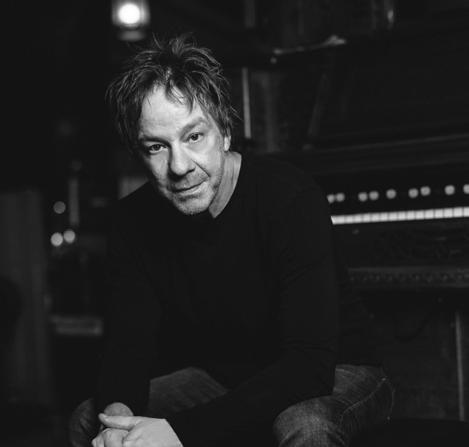
7 BETWEEN THE NOTES New Secretary-Treasurer Will Barrow introduces himself to members.
8 NEWS Local 257 and the AFM have been busy working to get Congressional support for the AFMA, and to help ensure right-to-work-for-less laws are not enshrined in the Tennessee Constitution.
10 HEARD ON THE GRAPEVINE
The comings and goings of Local 257 members.
12 GALLERY We recognize member milestones as well as other events and honors.
16 COVER STORY: JAY JOYCE Longtime Nashville live music fans know Jay Joyce from one or more of the storied local rock bands he led. But they may not know the details of how his career path brought him to where he is now: one of the most sought-after producers on Music Row. Writer Warren Denney talks to Joyce about how you actually can get there from here.

22 REVIEWS A diverse collection of reviews, including details on the Americana Music Association Awards show, and new releases from Michael Alvey and Mitchell Tenpenny.
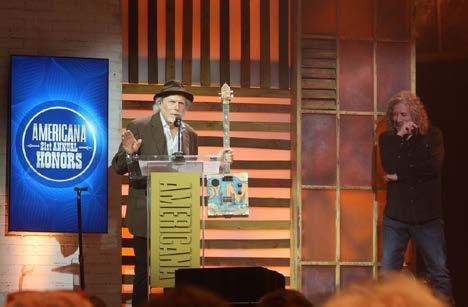
26 SYMPHONY NOTES New symphony steward Melinda Whitley gives a breakdown on how the hard-working orchestra committee takes care of business, and symphony musicians.
27 JAZZ & BLUES Austin Bealmear offers an update on local jazz and blues at local venues large and small, classes, festivals, and more.
28 FINAL NOTES We bid farewell to Roland White, Bill Walker, Ike Harris, Jerry Collins, David Robbins, Alan Cassaro, William Witt, and Marvin Lanier.
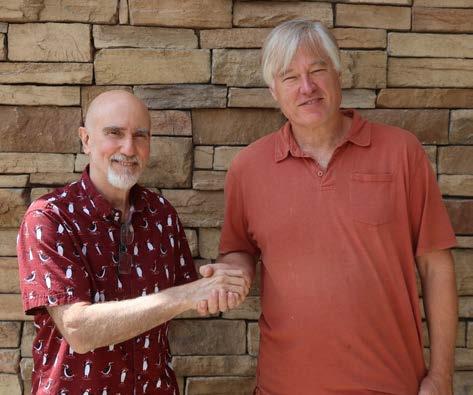
33 MEMBER STATUS
34 DO NOT WORK FOR LIST
OFFICIAL QUARTERLY JOURNAL OF THE NASHVILLE MUSICIANS ASSOCIATION AFM LOCAL 257

PUBLISHER EDITOR MANAGING EDITOR ASSISTANT EDITOR
CONTRIBUTING WRITERS
Dave Pomeroy
Will Barrow
Kathy Osborne
Leslie Barr
Austin Bealmear
Warren Denney
Melinda Whitley
Roy Montana
Kathy Osborne
Dave Pomeroy
The next general membership meeting of Local 257 will take place Thursday, Nov. 3, at 5:30 p.m. on Zoom by teleconference. All members will receive an email with instructions on how to attend with Zoom. The Local 257 annual dues amount for 2023 and a proposal to use $35,000 from the Emergency Relief Fund to keep membership dues from going up in 2023, due to the large increase in Funeral Fund payouts in 2021, will be discussed. This will be voted on by the members in attendance. Other important topics will be discussed at the meeting as well. If you need instruction on how to attend the meeting by teleconference, please call the local at 615-244-9514. Make plans to attend and stay involved in the business of your local.
BACKGROUND TO THE RESOLUTION TO BE DISCUSSED AND VOTED ON: Our bylaws require that all members equally share in funding our Funeral Benefit Fund with a portion of annual dues, based on the total payout in the previous FULL calendar year — in this case, 2021. In 2020, the FBF paid out $77,500, and the per member FBF assessment was $42 in the 2021 dues, which was the same number as 2020.
CONTRIBUTING PHOTOGRAPHERS
Leslie Barr
Tripp Dockerson
Donn Jones
Dave Pomeroy
ART DIRECTION WEB ADMINISTRATOR AD SALES
LOCAL 257 OFFICERS PRESIDENT
SECRETARY-TREASURER
EXECUTIVE BOARD
Lisa Dunn Design

Kathy Osborne
Leslie Barr
615-244-9514
Dave Pomeroy
Will Barrow
Jerry Kimbrough
Alison Prestwood
Biff Watson
Laura Ross
Steven Sheehan
Tom Wild
Jonathan Yudkin
The 2021 FBF payout amount of $138,000 divided by our current membership number of 2093 would be $66 each. This would mean a $24 increase in the 2023 Annual Dues. In order to bring the cost down, the Aug. 9 For Those We Lost benefit concert, and two other donations have raised $14,500 for the FBF which brings the per member number down to $59, a $17 increase from 2022. Our Emergency Relief Fund, (ERF) is currently very well-funded and has $102,000 in its account. As the maximum payout of the ERF is $3,000 and we typically get very few applications per year, the simplest way to keep the dues down would be to access the extra funding we need from the ERF. This will be on a basis to help all of our members equally by covering the $35,000 gap, and enabling the dues amount to stay the same for 2023 rather than have a significant increase. This will still leave more than $65,000 in the Emergency Relief Fund. Plus, the annual dues ERF contribution of $3 per member, which is matched by the Local, will replace at least $12,000 of that money.
PROPOSAL: On a non-precedential basis, Local 257 will use $35,000 from our Emergency Relief Fund to make up the large increase in the Funeral Benefit Fund’s payout from $77,500 in 2020 to $138,000 in 2021. This will allow the Annual Dues amounts to stay the same as the previous two years, which helps all of our members equally.
After thorough discussion and consideration, the Emergency Relief Fund Committee has given a favorable recommendation for this proposal, as does the Local 257 Executive Board. If this is not approved by the members, the dues will go up by $17 for both Regular and Life Member categories.
EXECUTIVE BOARD ALTERNATES
HEARING BOARD
Rich Eckhardt
Casey Brefka
Michele Voan Capps
Tiger Fitzhugh
Teresa Hargrove
Kent Goodson
Sarah Martin McConnell
Dave Moody
Paul Ossola
$170.00………………Local Dues (Life member 33 percent of regular member dues)
66.00………………AFM Per Capita (Life member per cap $50.00)
42.00………………Funeral Benefit Assessment
3.00………………Emergency Relief Fund
3.00………………Emergency Relief Fund (voluntary)
2.00………………AFM Tempo Fund (voluntary)
TRUSTEES
SERGEANT AT ARMS
NASHVILLE SYMPHONY STEWARD
OFFICE MANAGER
ELECTRONIC MEDIA SERVICES DIRECTOR
RECORDING/ELECTRONIC MEDIA
DIRECTOR, LIVE/TOURING DEPT. PENSION ADMINISTRATOR AND MPTF COORDINATOR
MEMBERSHIP
Bruce Radek
Biff Watson
Steve Tveit
Melinda Whitley
Savannah Ritchie
Heather Smalley
Paige Conners
Sarah Swensen
Cassandra Tormes
Leslie Barr
William Sansbury
$286.00………………Total 2023 Proposed Dues Regular Members (including $5 voluntary)
$170.00………………Total 2023 Proposed Dues Life Members (including $5 voluntary)
Executive Board recommendation: Favorable Emergency Relief Fund Committee recommendation: Favorable
VETERANS DAY
Friday, Nov. 11
THANKSGIVING
Wednesday, Nov. 23 at noon through Friday, Nov. 25
HOLIDAY BREAK
Monday, Dec. 19 through Monday, Jan. 2
Nashville Musicians Association
AFM Local 257, AFL-CIO
Minutes of the Executive Board
Zoom Meeting Aug. 2, 2022
PRESENT: Vince Santoro(VS), Dave Pomeroy(DP), Tom Wild(TW), Jonathan Yudkin(JY), Steven Sheehan(SS) , Rich Eckhardt(RE), Casey Brefka(CB), Alison Prestwood(AP), Jerry Kimbrough(JK).
ABSENT: Laura Ross(LR), Biff Watson(BW).
President Pomeroy called the meeting to order at 1:14 p.m.
MINUTES: Minutes from May 10 were previously approved online.
PRESIDENT’S REPORT: The following issues were discussed:
1. Retirement of Secretary-Treasurer, Vince Santoro, effective Sept. 1, 2022.
2. Dave and Vince’s recommendation for interim secretary-treasurer is Will Barrow.
3. The Board unanimously voted to elect Will Barrow interim secretary-treasurer.
1. We have a quote from Donelson Air to retrofit our vents with ones that each have dampers to control air throughout the office area. Will Barrow will have this information.
2. Replacement of the two HVAC units should be on a short list for Will Barrow.
3. Funeral Benefit Fund audit is being done by Marcum as in the past.
4. Vince and our CPA, Ron Stewart, are in the process of clearing up some problems with our Healthcare Trust and the filing of needed IRS documents covering past years. We’re having trouble getting cooperation from others in the Trust in sharing information.
MSC to approve secretary-treasurer report. RE, SS.
AGENDA:
1. New Membership Applications were distributed and discussed. MSC to approve new member apps. JY, AP.
2. Local 257 bottom line is in the black since last Executive Board meeting.
3. Benefit to be held at 3rd & Lindsley for “Those We Lost” proceeds to go to the Funeral Benefit Fund.
4. Pandemic Waivers for 3Q to be same as previous quarter. JK, TW.
MSC to adjourn. AP, RE. Meeting adjourned at 2:07 p.m.
PRESENT: Chris Carmichael, Vince Barranco, Lee Armstrong, Richard Wineland, Nell Levin, Michael August, Chuck Bradley, Ellen Angelico, Tatiana Cameron, Veronica Montez, Stuart Montez, Nicholas Gold, John Root, Clifford Koufman, Scott Hearn, Scott Metko, Brian Fullen.
EXECUTIVE BOARD PRESENT: Jonathan Yudkin, Tom Wild, Rich Eckhardt (alt).
HEARING BOARD PRESENT: Paul Ossola, Tiger Fitzhugh, Teresa Hargrove, Sarah Martin McConnell, Michele Capps, Kent Goodson.
PARLIAMENTARIAN: N/A.
OFFICERS PRESENT: Dave Pomeroy, Vince Santoro, Steve Tveit (sergeant at arms).
President Pomeroy called meeting to order at 5:37 p.m.
MINUTES: Minutes from March 3 were displayed and discussed.
PRESIDENT’S REPORT:
1. Restart of “Sessions” in Cooper Hall went well and will continue on every last Wednesday of the month.
2. Lawsuit with RFD was settled.
3. Premier Parking has imposed a duration limit of 9 hours for the 60 percent discount.
4. Live scales will need to be updated soon, perhaps early next year.
5. Clear filing of information on time cards is essential to getting paid. It is the session leader’s responsibility to make sure all paperwork is correct, complete and turned in promptly.
6. We are still discussing the possibility a mural on the parking lot wall.
7. Magazine expense may require a new approach. Printing less would save a lot.
8. 2023 annual dues will depend on Funeral Benefit outlay of 2021. We may need the ERF to fund some of it.
SECRETARY-TREASURER REPORT:
1. Membership drive added 57 new members.
2. In preparation for our HVAC update we’ve consulted with EnVision Engineering to determine the viability of our ductwork/dampers/reheaters before we sink a lot of money into a new system. They may also give us quotes on installation of mini-splits (like the units in our rehearsal hall) throughout the office area and lobby.
3. HUB Nashville has not given us a target date on which they’ll remove the trees that threaten our parking area.
MSC to approve secretary-treasurer report: Chris Carmichael, Paul Ossola.
1. Rich Eckhardt discussed ideas for cutting expense on magazine.
2. Lee Armstrong suggested that members who wanted hard copy could pay more in annual dues.
3. Kent Goodson talked about Bugles Across America for funeral events.
4. Nell Levin talked about UMAW (United Musicians & Allied Workers), a union we should be more aware of.
5. The American Music Fairness Act will be cosponsored by Marsha Blackburn
6. Right to work will be on the ballot to permanently be entered into Tennessee constitution, a very unnecessary piece of legislation. We need to work together to stop this from being passed in November. Vote NO on Amendment 1.
MSC to adjourn. Paul Ossola, John Root Meeting adjourned at 6:50 p.m.
get paid more than once when your work gets used again. That is the key element to Music City – a tradition of respect for intellectual property.
Music changed my life, and I can’t imagine what my life would be like if I had not followed my dream of a career doing what I love. I will always be grateful for the joy that it brings, and for the comfort of knowing it can be a healing force as well. If life was always a breeze, music might not have the power that it does, especially in times of trouble. As musicians and creators, we should take every opportunity to direct our creative energy in a positive direction.
As I come to the end of my 14th year as president of Local 257, in some ways it seems like a long time, yet in many other ways it feels brand new. We have had several changes in personnel here at the office over the past year, which always brings new perspectives on what we do and how we do it. It also renews the understanding of our core mission: to promote respect for musicians and the work that they do, and the intellectual property they create.
Dec. 2, 2022, is the 120th anniversary of the founding of the Nashville Musicians Association, AFM Local 257. I’m sure that the seven musicians who signed the original documents would be surprised to see where we are today. Once they got over their shock, I think they would be proud of the gradual evolution of Nashville into Music City. It didn’t happen overnight — it was the result of a huge collective effort over many years. People like Owen Bradley and Chet Atkins took a stand that if companies were coming to Nashville to make money on hillbilly music, they should treat the musicians they hired with respect, and put their work on AFM contracts. This has allowed us to obtain compensation for musicians and their beneficiaries for the use of records recorded decades ago. The power of an AFM contract protects your work and ensures that you can
Constantly evolving technology has brought new methods of creating, sharing, and selling music that has changed our industry in many ways, both good and bad. This mirrors what is happening in the world, and when we retreat into the world of technology vs. human interaction, the downside can be that we don’t listen to each other enough. Music can bridge that gap and bring people together, even if they have philosophical or political differences.
Over the past decade, we have expanded our reach into new areas and have come up with innovative ways to accommodate the inevitable changes technology brings. This includes the Single Song Overdub contract, designed for home recording and file sharing situations that were previously difficult to accommodate. The $100/song minimum scale allows the flexibility to be properly compensated at a higher rate as well as keeping simpler overdubs affordable. Tracks on Tour, which we brought to the 2017 SRLA Phono negotiations and successfully bargained into the contract, has paid studio musicians more than $600,000 to date for the use of their studio tracks on major tours.
There is legislation moving through Congress that will have a huge effect on the lives of musicians. The American Music Fairness Act (AMFA), cosponsored by Tennessee Senator Marsha Blackburn, will be a game changer by freeing up hundreds of millions of dollars in foreign airplay royalties for artists, labels, and backup musicians and vocalists as well. The whole world pays these royalties, except for a few exceptions – Iran, China, North Korea, and (gulp) the United States! Our AM/FM radio broadcasters refuse to pay anyone but songwriters. This has been going on far too long, and we are closer than ever to fixing this decades-long injustice. The AMFA bill is written to ensure that small radio stations and nonprofits are not unduly burdened, and contains language that ensures no money will be taken out of songwriters’ pockets. Please let your U.S. Representatives and Senators know that you support this long overdue legislation.
When you go to the polls Nov. 8, we ask you to vote NO on Tennessee Amendment 1, which proposes enshrining the right-to-work legislation passed in 1947 into the Tennessee State Constitution. This would make the already-existing right-to-work (for less) law much harder to modify or undo. Because of the hard-won respect for musicians championed by the founders of Music Row like Bradley and Atkins, we have thrived in spite of this law — not because of it. It is worth noting that the rise of major labels, publishers, and an unparalleled songwriter and musician community in Nashville, all happened in the decade after that legislation was adopted in 1947. The high level of voluntary compliance by employers working on AFM contracts has made a huge difference in the lives of thousands of musicians. We need to vote down Amendment 1, or we will face even more obstacles to making sure musicians are being properly compensated and their intellectual property is protected.

When I came to Nashville, I never thought that one day I would be leading Local 257 through the challenging transitions of the 21st century. I will honestly say that if I couldn’t still play the bass, I’m not sure I could handle the pressure of it all. Making music can help makes sense out of this crazy, complex world we are living in. I am honored to represent all of you, and appreciate your support, feedback, and loyalty to the only organization looking out for U.S. musicians.
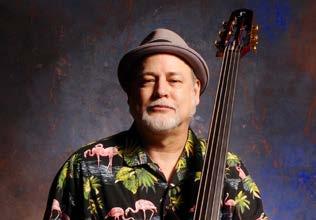
“When you go to the polls Nov. 8, we ask you to vote NO on Tennessee Amendment 1, which proposes enshrining the right-to-work legislation passed in 1947 into the Tennessee State Constitution.”BY WILL BARROW
Itis my honor and privilege to begin serving as secretarytreasurer of the Nashville Musicians Association. I am excited about the possibilities for growth, at AFM Local 257 and in myself. And I’m thrilled to be working with great people, for the betterment of musicians in Nashville and beyond. This opportunity is the culmination of many decades playing music, of being a part of the music community here and of a desire to be a part of the evolution of our union.
My journey in music started in Gainesville, Florida, in a rich musical environment. There was much amazing and diverse live music in Gainesville then, and it had great radio stations and record stores. Tom Petty and two of the Heartbreakers, two of the original Eagles and Stephen Stills all went to my high school a decade or so before me. The quality of music in the popular culture in the ‘60s and ‘70s inspired me to want to learn how to play and sing. I became enamored with the piano, and taught myself to play by ear while taking classical piano lessons. I started playing gigs in college in Tallahassee, Florida.
I moved to New York City a few years later, to get a graduate degree in music, and to learn about professional musicianship on a larger scale. The greatest education I got, and continue to get, comes from working with great musicians, singers, producers and writers. It was in NYC that I first joined the AFM, with Local 802. I did jazz and R&B gigs there, some sessions, club dates and work on Broadway. The Broadway work led to a two-year stint as conductor-pianist of A Civil War, with Larry Gatlin and BeBe Winans. I also started writing songs, which led me to check out what was going on in Music City.
I moved to Nashville because I was very inspired by the songwriting culture there, and encouraged by the possibilities of work touring and recording. I was fortunate to get a nice road gig with a fine Americana/country artist, Suzy Bogguss, when I first moved here. The bass player on the tour was none other than Dave Pomeroy. The first record date I did in Nashville had Dave on it also, along with the late great Kenny Malone on drums. I knew at that point that I’d made a good move, and it’s been a rich musical life here ever since. I also joined Local 257.
I’m grateful to have had a steady string of touring work with great artists like Gregory Porter, Crystal Gayle, the Gatlin Brothers, Wanda Jackson, and Steve Wariner. I’ve played and fraternized all over the country and world with so many fine musicians and human beings! I started touring less when my wife, Heather, and I started a family. Our boys, Levon and Willie, are now 10 and 9. I’ve also been afforded the opportunity to record with an eclectic group of inspiring artists like Gilbert O’Sullivan, Tommy Emmanuel, Suzy Bogguss, Rosie Flores, The Indigo Girls, Benny Golson, Gail Davies and Alison Brown.
A few years after moving to Nashville, I began to record CDs — remember those? — of original songs, and to do singer-songwriter
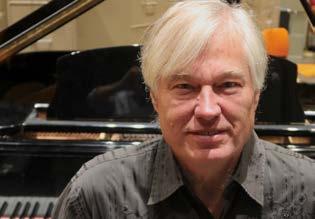
gigs, in venues in town and on the road. I am currently developing a solo project that features modern and original interpretations of classical piano repertoire, featuring different grooves and some improvisation. I also am part of a Brazilian band, Tudo Bem, that is gigging locally. I’ve never been more inspired to play, write, perform and record music. And I’m still very active as a sideman, with singers and instrumentalists in a variety of genres, with singer-songwriters, in musical theatre, on some out-of-town dates and on sessions. And I’m still writing songs, the thing that really brought me here. I’m more excited about performing, recording, writing, learning and teaching music than ever, and will be doing all of that along with my work at Local 257.
I took this position because I believe this organization works for the betterment of the lives and the music of members, and of all musicians. Dave Pomeroy is a tireless advocate for musicians, along with being an uber-accomplished, touring and recording bassist. He has a genuine desire to bring people together, and to help the union evolve. There’s no one else I’d rather be working alongside while doing this. Vinnie Santoro did a great job and has been a big help. All the best to you, Vinnie!
Nashville is changing, and the musical community is evolving, and becoming more diverse, with musicians and songwriters moving here from all over the country and world. I believe our AFM can play an important role in this evolution, and can become more diverse as our city and music scene become more diverse. I’m excited about being part of this growth and outreach. I’m often asked “What can the union do for me?” or “Why should I join the union?” The answer includes a long list of important things the union does. But, in my view, equally important questions are, to paraphrase JFK, “What can we do together, through the union?” and “What can I do to help in this process?”
Musicians are a family (albeit a dysfunctional one sometimes), and a brotherhood and sisterhood. In Nashville, and all over the globe, we musicians are brought together by our love of playing our instruments and of making music together. Many of us are also united by the fact that we have chosen music as a profession and a livelihood. I believe we can and should help each other to do better, financially and artistically. We are all in this together. The union — like our music itself — is also a way that we connect with each other, and with the community. There is no community of musicians anywhere that is quite like the one we have here. The standard of musicianship, possibilities for recording, touring, collaboration, etc., make it unique. I am very happy to be part of it, and to now be more involved in what AFM is doing with and for this community, and beyond it. I know many of you, and look forward to meeting many more of you, and to serving in the organization that does so much to make our lives richer and to elevate our music. Please reach out and let me know if I can be of help.
Many of us are united by the fact that we have chosen music as a profession and a livelihood. I believe we can and should help each other to do better, financially and artistically. We are all in this together. The union — like our music itself — is also a way that we connect with each other, and with the community.
Please make sure you exercise your right to vote on Election Day, Nov. 8. And, when you go to the polls, be sure you vote “No” on the amendment to enshrine anti-union “Right to Work for Less” language in the Tennessee constitution. This legislation is a ramped-up attack on working families. Even though Tennessee musicians and every other working citizen in the state already struggle under current laws that favor corporations and employers, that’s not enough for the anti-union groups who see pro-union sentiment growing every day in Tennessee and across the nation. Your union has your back, but we need your help to keep our voice strong. We need to strike down the current laws, not allow those who would dismantle every union and destroy every shred of hard-fought worker’s rights forever to increase their stranglehold on workers across the state.
Please reach out to your U.S. Congressman or Congresswoman and ask them to support H.R. 4130, which is currently in the House Judiciary Committee. The bill was introduced in June of 2021, and then moved to the Congressional Judiciary Committee. In February 2022 a group of stakeholders addressed the Judiciary Committee about the importance of passing this bill. Local 257 President Dave Pomeroy was one of several musicians and music business executives who addressed Congress. “[This bill] would fix a 70-plus year injustice which has prevented musicians and singers from being compensated when their music is played on AM/FM terrestrial radio. The only other civilized countries that don’t pay musicians and singers for their intellectual property are Iran and North Korea. That should tell you everything you need to know about the broadcaster’s approach to this issue. They have been getting away with the theft of intellectual property rights for decades, so of course they don’t want it to change. The AMFA addresses any and all concerns about small, community, and nonprofit radio stations that might be impacted by having to pay royalties, or the myth that any money paid to musicians and singers would come out of the songwriter’s revenue stream.
“Overseas collectives are holding money that belongs to us, to the tune of $200-300 million a year, because we don’t pay foreign musicians for the much smaller amount of music made overseas that is played on U.S. AM/FM radio. If we can pass this bill, that revenue stream will be freed up at last and will help many American musicians and singers and boost our country’s economy. It’s way overdue, and we will be working hard to get Congress to do its job and make this right. The multibillion-dollar broadcasting industry can afford to do this – no more excuses,” Pomeroy said.
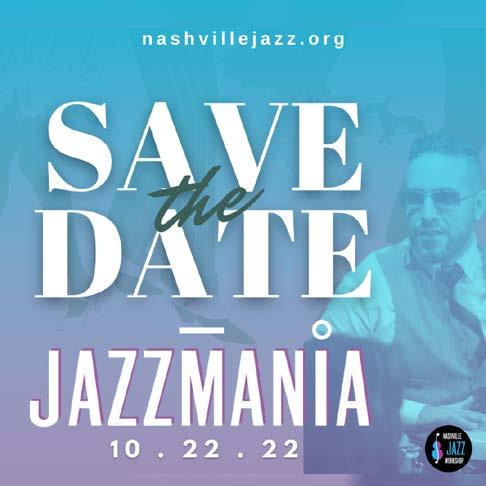
We wish Vince Santoro a happy retirement, and welcome our new secretary-treasurer, Will Barrow.
Drummer Vince Santoro, who served as Local 257 secretary-treasurer for eight years, stepped down at the end of August. In a Local 257 executive board vote held Aug. 2, Will Barrow was elected as interim secretarytreasurer to fill the remainder of Santoro’s term. Barrow is a keyboardist and a longtime member of Local 257.
“We thank Vince for his years of service, and welcome Will, who we know will be a great addition to the Local 257 office,” President Dave Pomeroy said.
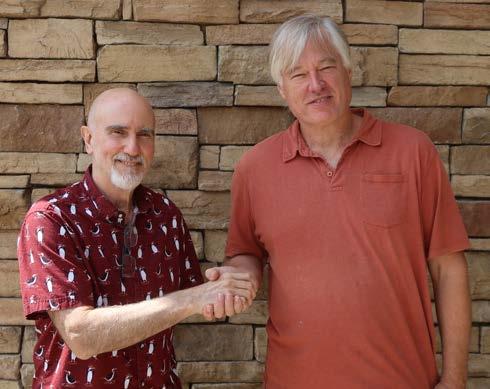

Dave Pomeroy speaks during a panel on community engagement held at the 23th Annual Americana Fest in September. The panel was moderated by Erin McAnnally, and featured panelists from Texas, Arkansas, and Tennessee.
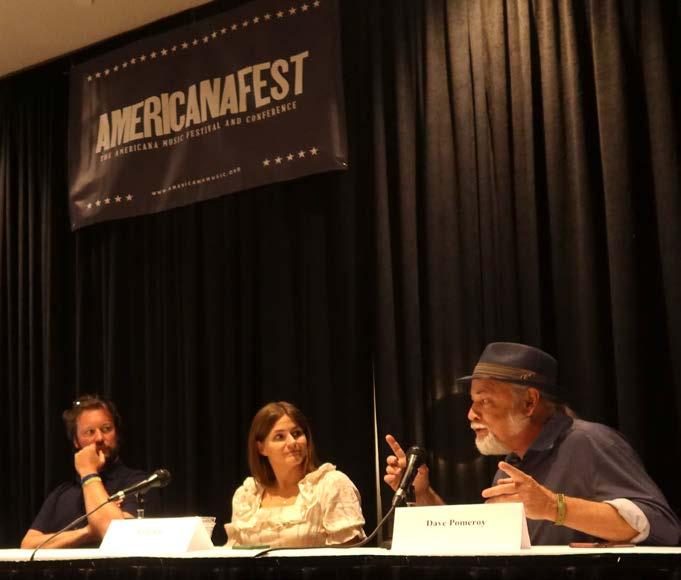
ACM Studio Award winners for 2022 included some new faces along with repeat honorees. Awardees were announced last May and honored Aug. 24 during the ACM Honors event held at the Ryman Auditorium.

HERE’S THE LOCAL 257 WINNERS LIST:
Bass player of the year ...............................

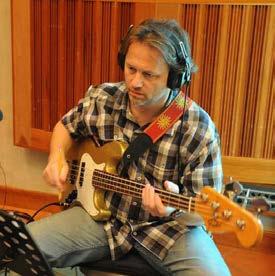
Drummer of the year ...................................

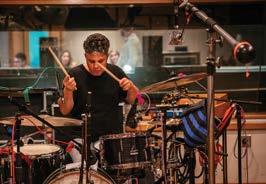
Acoustic guitar player of the year ..............

Electric guitar player of the year ................
Piano/keyboards player of the year ...........
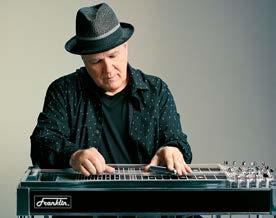
Specialty instruments player of the year ...
Producer of the year....................................
JIMMIE LEE SLOAS
EVAN HUTCHINGS
CHARLIE WORSHAM


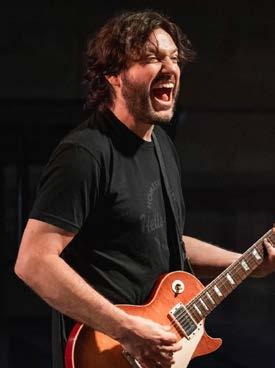
TOM BUKOVAC
DAVID DORN
PAUL FRANKLIN
DANN HUFF

Music Row Magazine released its list of 2022 award winners online Aug. 30. Once again, Local 257 members swept the Top 10 Album All-Star Musicians category, which recognizes the studio players who performed on the most albums reaching the Top 10 of Billboard’s Top Country Albums chart during the eligibility period. The honorees are:
Bass ..............................................................
Drums............................................................
Fiddle ............................................................
Guitar ............................................................
Keyboards .....................................................
Steel ..............................................................
JIMMIE LEE SLOAS
TIE: JERRY ROE AND NIR Z
JENEE FLEENOR
ILYA TOSHINSKIY
DAVE COHEN
PAUL FRANKLIN
Congrats to all Local 257 members who won or were nominated!
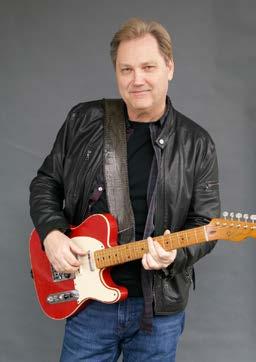
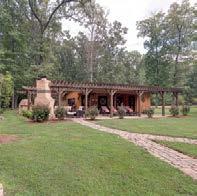
Local 257 life members Steve Wariner and Gary Nicholson have been named to the NSAI Hall of Fame as part of the 2022 class, which also includes Shania Twain, Hillary Lindsey, and David Malloy.
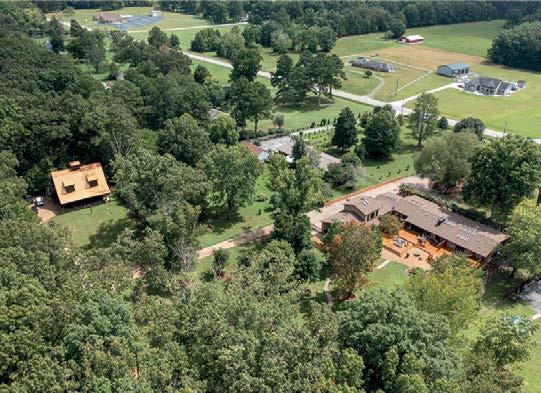
Nicholson will be inducted as one of the representatives of the contemporary songwriter category. He is a two-time Grammy winning producer and is also a member of the Texas Heritage Songwriter’s Association Hall of Fame. Nicholson has more than 500 recordings and is best known for his work with Willie Nelson, Waylon Jennings, Garth Brooks, George Strait, Ringo Starr, BB King, Fleetwood Mac and Billy Joe Shaver.

“I came here in 1980 and I’ve attended many hall of fame inductions through the years. I never imagined things would evolve and, after these 42 years, this would actually occur,” Nicholson said. “I am a product of this environment, this community of amazing songwriters and publishers. It was that synergy and that community that shaped me and gave me a way.”
Wariner, whose nomination is in the veteran/songwriter category has released 18 studio albums and over 50 singles — ten of which reached No. 1 status. He has four Grammys, three CMA awards, and one ACM award. He is a member of the Grand Ole Opry, and was named one of five CGPs (Certified Guitar Players) by the legendary Chet Atkins. After the NSAI announcement in August, Wariner talked about forming his publishing company and of his training as a writer. “There’s so many other writers who probably deserve this more than I do, but none that will appreciate it any more, I can guarantee you that,” he said.
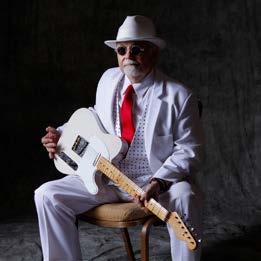
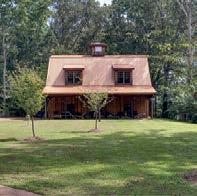
The songwriters will be officially inducted during the 52nd annual Nashville Songwriters Hall of Fame Gala Oct. 30, at the Music City Center. TNM




1. Keyboardist STEVE SHEPHERD digs his life member pin and the Local 257 rehearsal hall baby grand.
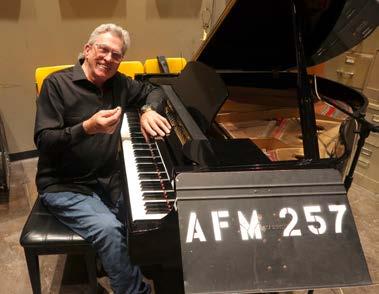
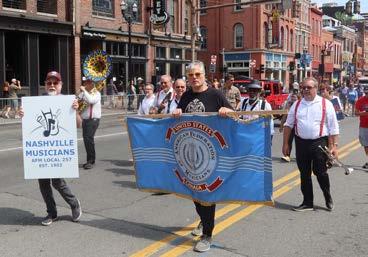
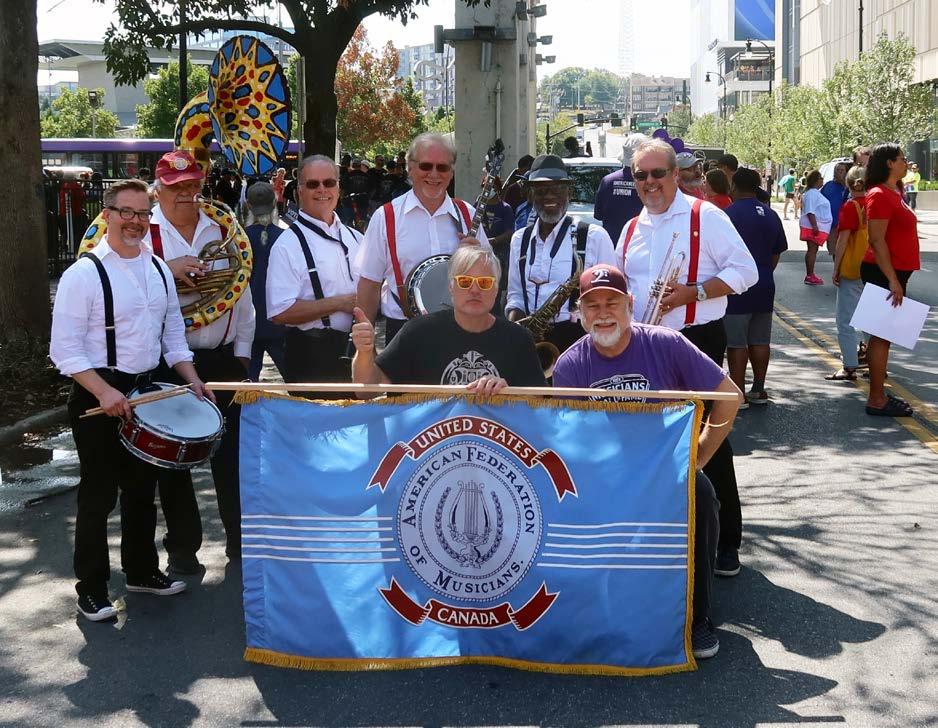
2. Multi-instrumentalist DAN JONES brings his vintage Gibson banjo to help celebrate his 25-year pin.
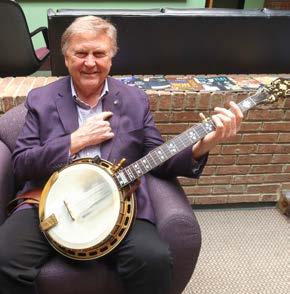
3. The inimitable KENNY VAUGHAN flashes his new life member pin, his Brad Paisley Telecaster, and a big smile while visiting Local 257.
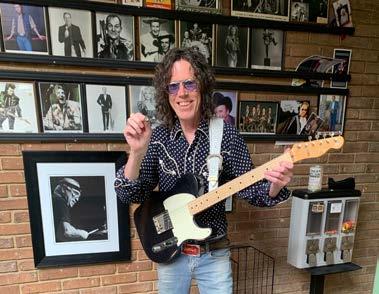
4. Life member NORMA ROGERS shows off her new 50-year pin, her Muramatsu gold flute, and her Burkhart piccolo. She continues to play — giving house concerts to raise money for cancer research.
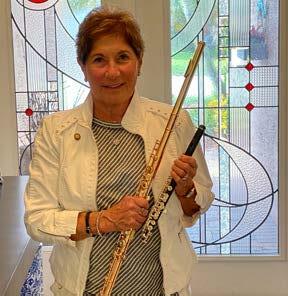
KENNY LOVELACE has been playing guitar and fiddle with Jerry Lee Lewis for 54 years. He was honored as a Nashville Cat during an event at he Country Music Hall of Fame and Museum July 16. He was interviewed by Mark Gray and performed a few songs with family and friends.
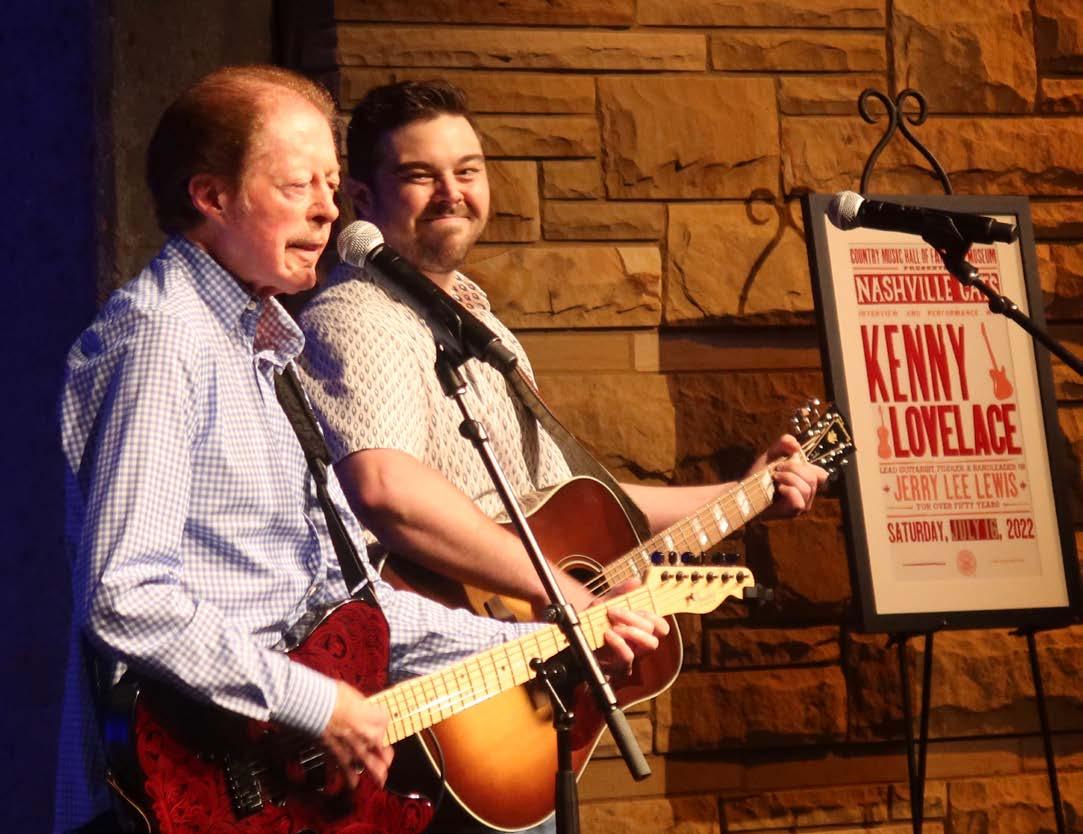
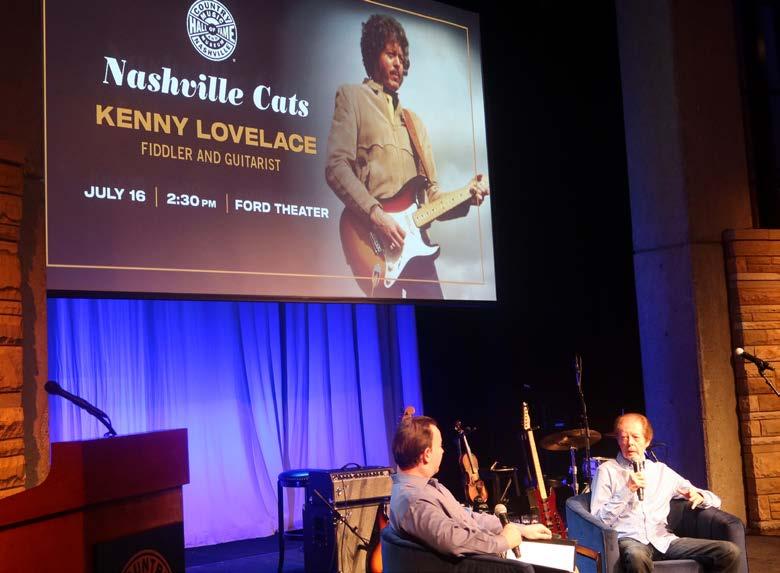
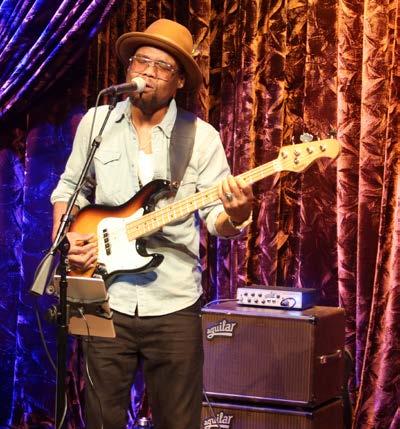
Local 257 raised over $5000 with a concert to help the Funeral Benefit Fund, which was impacted with a large number of member passings over the last two years, exacerbated by the COVID-19 pandemic.
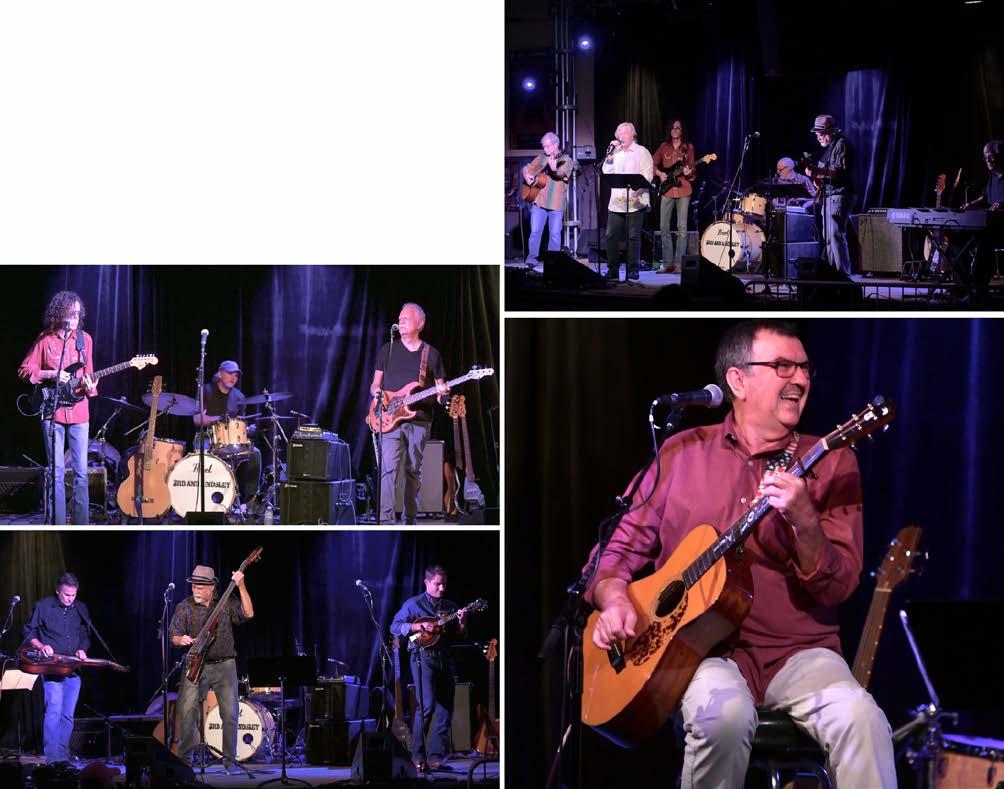
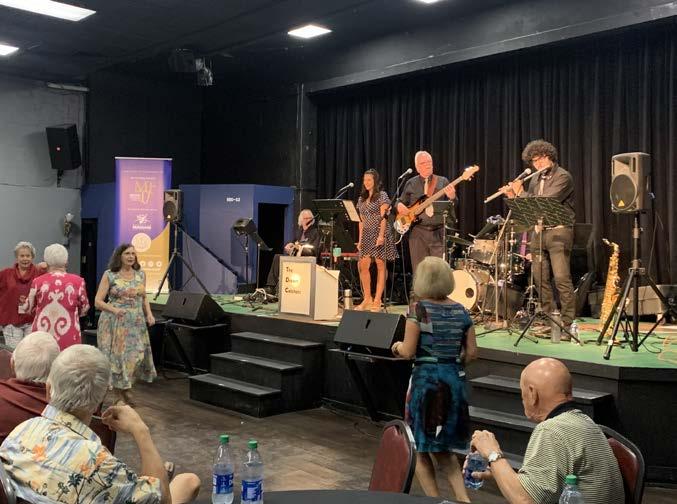
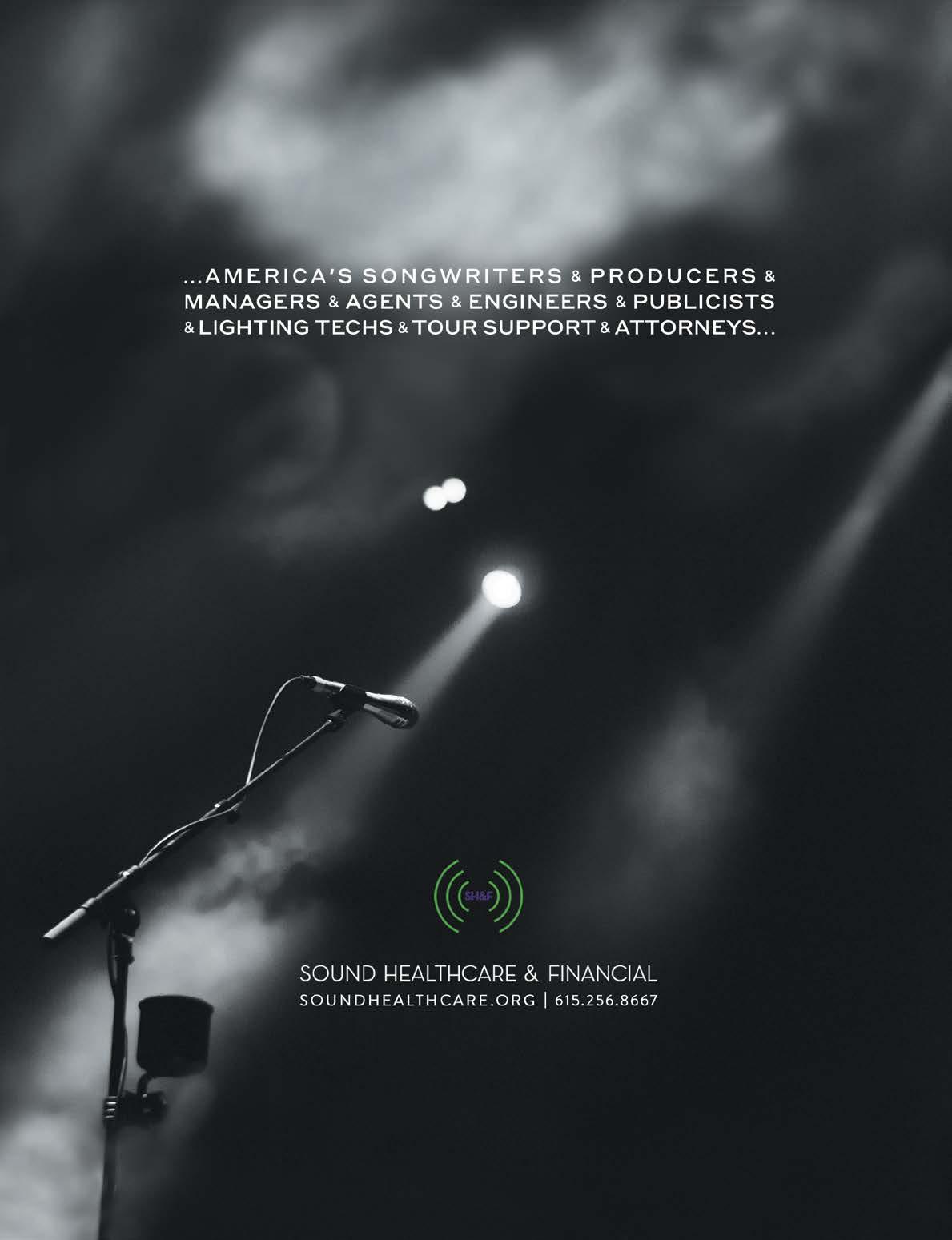

 - Written bywarren denney
- Written bywarren denney
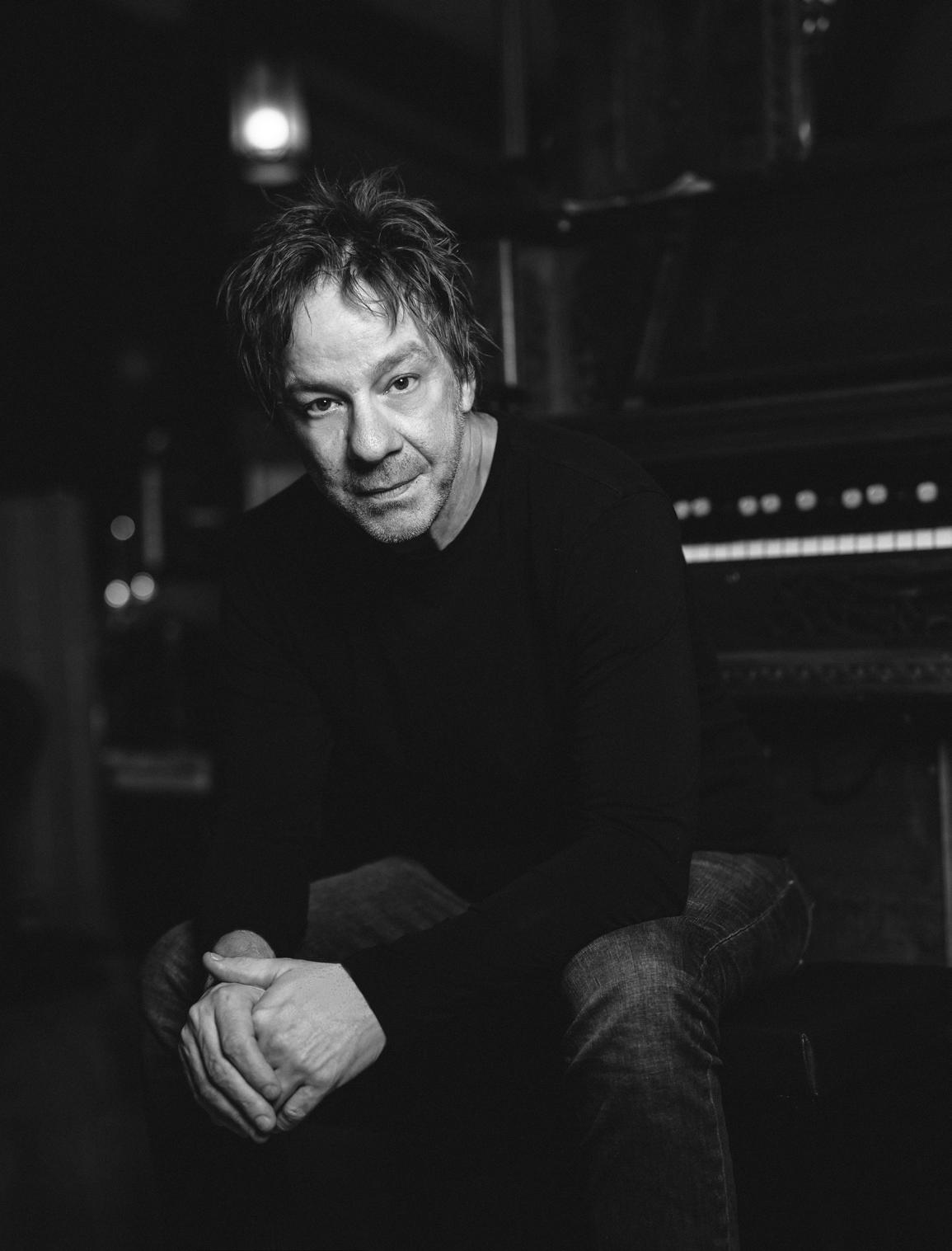 Photo: CeCe Cawson
Photo: CeCe Cawson
There is an unexpected innocence about Jay Joyce. Even ironic. He appeared in Nashville years ago, out of nowhere, with guitar in hand as so many do — a rock & roller in a town that was straining with its identity, eager to shed a certain veneer.
bands, and helping them with their records, or I was always the guy with a little studio that I made. And, I did a lot more writing back in those days, too. Sessions, whatever I could do.”
Joyce speaks to those days from a spacious studio now, St. Charles, housed in an old church in East Nashville, which has become somewhat of a temple, and is literally concrete evidence that big country and rock & roll can marry, and thrive. His success is as much a surprise to Joyce as it is to anyone.
Those distant, transient days for Joyce in the 1980s and 1990s of In Pursuit, Bedlam, and Iodine, held forth in long-gone venues here like the Ace of Clubs, Cantrell’s, 328 Performance Hall, and others too fleeting to mention, were rooted in a loud, exquisite rebellion. Importantly, his bands were spending real time on the road, spreading a faint notion that Nashville was open to all.
Joyce, a riotous ghost, embodied that notion. He made music. He recorded music. He was here, but he wasn’t. Swimming upstream, he seemed pure somehow. Today, this unlikely innocent has become the most sought-after producer in town. And, his impact on country music today cannot be understated. Country.
Not to say he has abandoned rock & roll, because he hasn’t — Joyce has found the golden edge that runs between the two and made real, influential music across the spectrum.
He has produced records for Miranda Lambert, including her recent Wildcard, Eric Church, Keith Urban, Carrie Underwood, Little Big Town, Gary Allan, Emmylou Harris, Thomas Rhett, the Randy Rogers Band, performance artist Orville Peck, Zac Brown Band, Ashley McBryde, Tenille Townes — a list that surprises at almost every turn. And, that’s just leaning country. He has produced huge records for Cage the Elephant, and, as a guitar player, appeared on records by the Wallflowers, Crowded House, Iggy Pop, Gillian Welch, Macy Gray, and others.
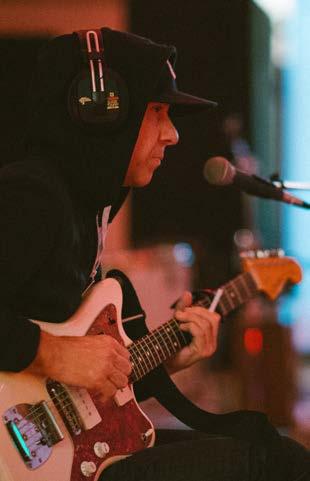
“Man, I wish there was some sort of a planned situation, but it's pretty weird how stuff works out,” Joyce said, recently. “I think for me, I just always tried to keep busy and work, you know? Even when I was in bands, I was always working with other musicians or

“It’s just life throws things at you, and you zig this way, and zig that way,” he said. “I never would’ve thought in a minute that I would have a career in producing country records. It’s just bizarre. There were some people interested in me playing on some country records early on, which I didn’t really know much about, to be honest. Frank Liddell had me come play on a Jack Ingram record and a Radney Foster record, and a couple of other records like that. Country was changing from what I thought it was. You get a little bit more open to new ideas.
“The crazy thing to me is what I thought was country when I was growing up in Cleveland. I thought the Eagles and Charlie Daniels — who was doing more of an Allman Brothers thing then — were country. That was the kind of music I thought of as country music.”
Often, in Nashville’s desire to hold things closely, has held its perceived enemies even closer at times. Rock & rollers have been streaming here to write and record for decades. And, even though Dylan blew the scene wide open for artists when he showed up to record Blonde on Blonde in 1966, the reality of everyday musical life in Nashville remained hidden. Perception is rooted, if not misinformed.
Of course, musicians and songwriters know there is little separation behind closed doors. Nashville was elemental in breaking R&B with WLAC and the records being produced here. Bluegrass, blues, gospel, rock & roll, soul, even jazz, have all found succor in this town. Musicians and singers from all corners have been fundamental in creating and sustaining a blood flow beneath a magnificent country paladin, one that benefits greatly from that nourishment.
Artists working here, living here, find those outer rings emanating from the core of the business of making records, the space in which Nashville
“The guitar is what I use to reinvent myself,” he said. “If I go back and start learning something on guitar, then I’m applying it. I can’t really explain it. It just helps me think outside the box and reinvent things.”
begins to reveal itself more expansively. Joyce knew none of this when he moved here.
“I lived in Cincinnati for a little while,” he said. “I played in a blues band there for a short time, and then went back and worked in Cleveland for a while more, did some traveling with club bands. And, then I just wound up in Nashville, because Mike, my brother, was here. Playing bass. I just dug into that world.
“I do remember getting here and thinking I could try to be a session guy, just trying to find my way. Then, I realized I’d be better off if I just made my own music, and then try to break in a bit. I didn’t really connect with inspiration or what was going on here at first, so I decided to start my own bands and write my own music, do that kind of thing and hole up. I didn’t really have any studio mentors, so I learned a lot of stuff wrong. But in a weird way, I did it so much that I figured out a way to make it right, or just to find my own style. I think it does come from not really knowing what the f*** you’re doing. That’s usually where good style comes from — just spending enough time to make sense out of the unsensible.”

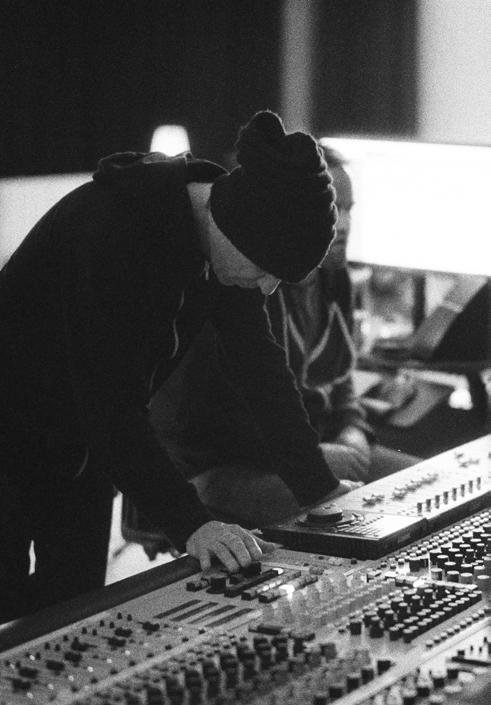
Joyce, perhaps unwittingly, was also making more sense out of the city. He began to understand, if not embrace, those outer rings. Nashville was opening itself to him, exposing the established scene, and the ephemeral layers and possibilities of the future.
“And, there’s always the traditional world of that,” Joyce said. “I learned a lot about it the last twenty years. I always did like certain elements of country music, but let's face it, to be in the ‘80s and early ‘90s, it was pretty bad. Now everybody wants ‘90s country, which is wild. So, you never know — everything had that horrible digital sound to it.
“But, even in those days, I was around for the Steve Earle, Dwight Yoakam, Lyle Lovett, Rosanne Cash times, and this cool
new world of people messing with it. Even the Scorchers, and Rank and File. Stuff like that. Country was wide open. I think Nashville’s really come a long way. Now, country music is one of the more popular genres, you know — it’s where all the white people get to rock out a little.”
Even as Nashville and Joyce tentatively held to one another, he was aloof, an outlier as the community was showing signs of turning toward him. And, though there were palpable changes afoot, he remained distant.
“Really, it was always far away for me,” Joyce said. “I was not involved at all with Music Row, and there was so much going on there. My whole world was connected more to New York or L.A., and I just happened to be in Nashville. In fact, I worked a lot in those cities. New Orleans, New York, L.A. back in the day. We didn’t do that much work in Nashville, but we did some. I knew there was a scene here. [Vanderbilt radio station] WRVU was involved and there was a small, but real, thriving thing.”
Despite his far-flung work and his well-known penchant for keeping underground, Joyce was uncovered. Country music found him. It always does. Notably, he played guitar on early Miranda Lambert records, and people began to realize he could bring something that the music needed. His first real shot across the bow was Eric Church’s Chief
“Yeah, absolutely. It found me,” he said. “It wasn’t my plan. I wasn't looking for it. And it was the timing of what was happening, too. Like working on that early Eric Church stuff. I’d done a ton of records before that, but I think it was just my sensibilities with an artist
continued on page 20
“I didn’t really have any studio mentors, so I learned a lot of stuff wrong. But in a weird way, I did it so much that I figured out a way to make it right, or just to find my own style.”
who’s really solid in who he was — where he was from. So, it’s like, you can do a lot with an artist like Eric Church, and it still sounds like a country record. I got lucky with that.
“That was the first [country] thing I produced. I had played on some records and stuff, but most of the time when I was hired to play on something, it was to be the outside guy. Nobody was looking at me to be Brent Mason, or something. Eric was definitely the first production situation, which was all an experiment. And, I have to hand it to him for even being open-minded enough back in that day and age to do that. He was a brand-new artist with a new record deal he had worked hard to get — for him to say, ‘No, I don’t want to use the main producer …”
Today, with massive success, Joyce’s perspective is sharpened. The outsider must have an inside eye, and his is discerning, even acerbic at times. He bemoans a perceived lack of willingness out there to breathe and take time with music.
“The one thing about Nashville, man, is there’s so many great players, they can do this and do that, but they lack an identity of who they are,” he said. “At least, many of them. And, a lot of what you have here, to me, is the move with an ulterior motive to get a publishing deal and make it, and to learn how to be a star. I can’t say that I really had much of a plan when I got here. I was just making music every day, everywhere I could.
“Just a lot of hours of playing music. Playing music, jamming. I think it’s what’s missing. Even in a lot of songwriting today, nobody gives it time to be bored and come up with a song. There’s always an agenda. I got a title, let’s write.”
Joyce looks at studio work differently, too. He likes a blend of the artist’s band and session players. It’s his way of getting a little more blood in the game.
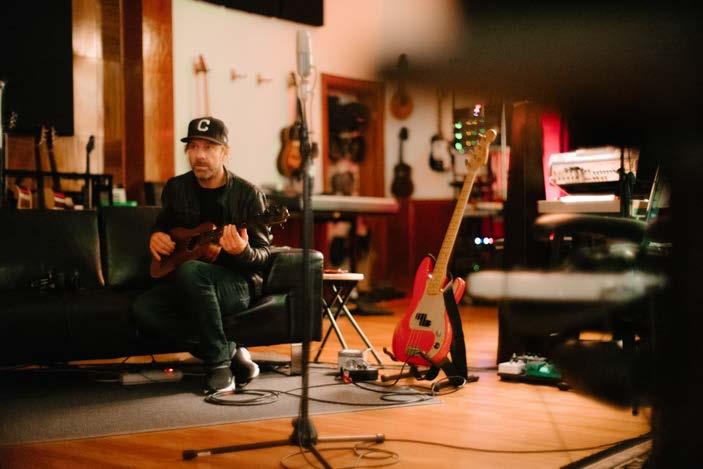
“I like the session guys — I like a lot of them,” he said. “For me, it’s if you set up the session the right way, you’ll find what you want. The way I run my studio and my process is more … it’s a little bit more like a jam. Nobody’s holed up in a room. Everybody’s together just playing music. And I think what I try to do most of the time, if possible, is to use some of the artist’s band and have a combination.
Because the session players are amazing, and they bring the hook and ideas and parts, which some of the live guys are great players, but they can’t really come up with the part, the hook.
“So the combination of the two, generally, if the person’s in the band and working with the artists and they’ve got a history, they’re just going to put more love into it. They're going to try harder. And, usually, if there’s an obstacle because the players aren’t the greatest, that’s ok, too. It usually winds up being a more unique sounding record because you work on those weak spots, and you make them good.
“That can give it a unique tone. It’d be easy to get all great players and knock it out. It’d be easier and quicker, but I think the result is just a little better when you get — and don’t get me wrong, the live players aren’t any worse — I don’t mean that. What I mean is, it’s kind of like the whole thing of necessity being the mother of invention. And, if it’s a little bit tougher to get there, in my experience, it usually is a more interesting record later on.”
Of course, Joyce, is a guitar player at the end of the day. He knows how to work. He knows how to chop wood when it’s called for. He knows how to fall off the cliff when needed. It informs everything he does, regardless, because he thinks through the instrument.
“The guitar is what I use to reinvent myself,” he said. “If I go back and start learning something on guitar, then I’m applying it. I can’t really explain it. It just helps me think outside the box and reinvent things. If I’m ever stumped or hitting a dry thing, then I just hole up and play some guitar for a while. Learn a few new things and it just winds up applying to the recording process.”
Joyce is pushing the music forward. It’s how he fits in the world.
“I think country music is popular because I think it’s the only real music right now that’s in the process of invention, or something,” he said. “There might be some traditional country people that don’t necessarily like that, but there were a lot of people that didn’t like what Dwight and Steve were doing, and all that. So, there’s always going to be the rub. But it’s reinventing itself more than most things are right now. And, I think that’s because of the whole melting pot.”
“It’s just life throws things at you, and you zig this way, and zig that way, I never would’ve thought in a minute that I would have a career in producing country records. It’s just bizarre.”
• I have two consoles (boards in my studio), a Sphere Eclipse C (super rare) and an MCI 400 series console.
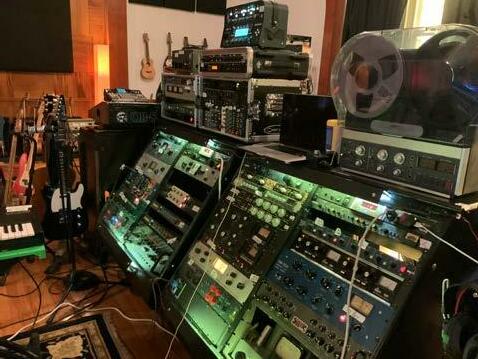

• I like having the board in the room with the musicians, not in a “control room.”
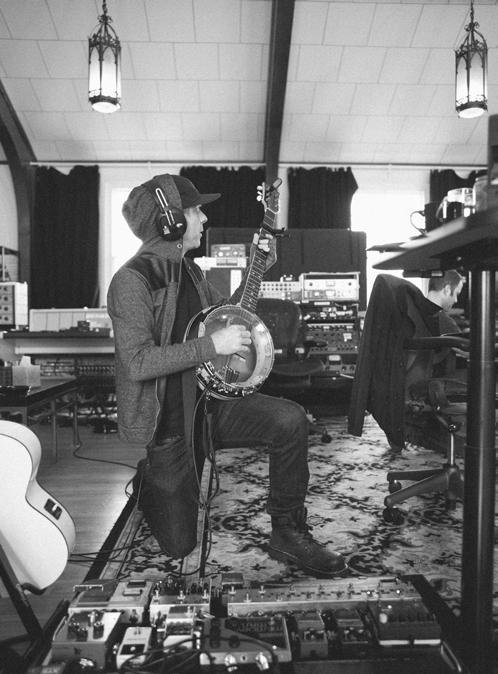
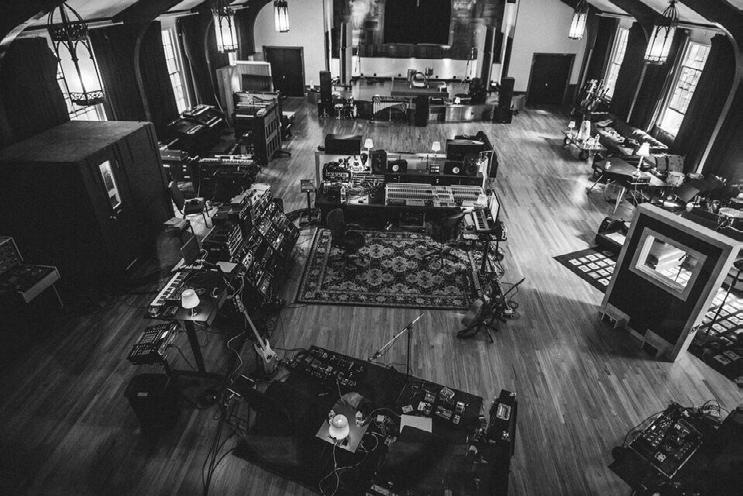
• Tons of outboard gear. Some of my favorites are:

• Neve 1064
• RCA Ba 6a

• Vintage Teletronix La2a
• Chandler EMI limiter
• There are tons of guitars here. I usually play my Gibson J200 or my 1971 Fender Tele deluxe, but recently I’ve been playing a Fender Artist series Brent Mason Tele with B-Bender.

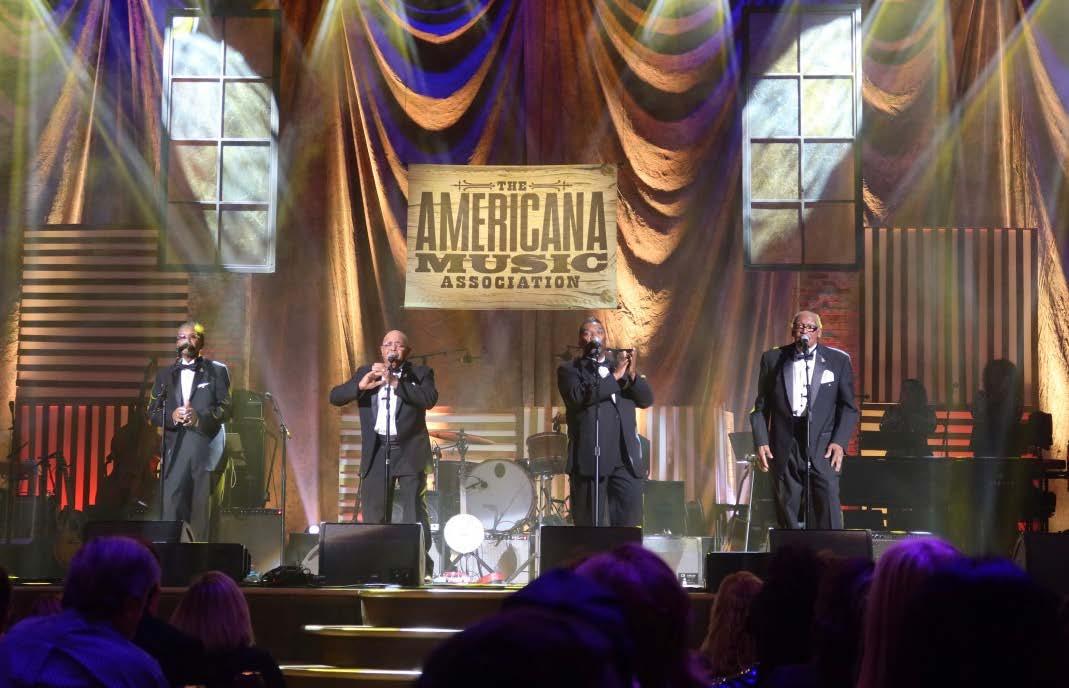
The 21st Annual Americana Music Association Awards were held Sept. 14 at the Ryman Auditorium, and were filmed under the AFM Public Television contract. Local 257 guitarist/vocalist/producer Buddy Miller was the show’s musical director, as he has been for many years. The great house band included Local 257 keyboardist Jen Gunderman, Local 47 bassist and producer, Don Was, Local 802 multi-instrumentalist Larry Campbell, drummer Brady Blade and keyboardist Rob Burger.
The McCrary Sisters, including Local 257 member Regina McCrary and her sisters Ann and Alfreda, sang with the house band and were also featured singing “Amazing Grace” in honor of their late sister Deborah. The multi-leveled diversity of the Americana music community is unparalleled in any other genre, and this year’s show
shone a broad spotlight on that very unique quality. Award winners included The War & Treaty, Brandi Carlile, Allison Russell, Sierra Farrell, Lauren Maestro, and Billy Strings.
Lifetime Achievement awards were presented to gospel icons The Fairfield Four, and country music great, Don Williams, which was presented by his longtime co-producer Garth Fundis. Local 257’s Lyle Lovett presented Chris Isaak’s Lifetime Achievement Award with a hilarious song in his honor. As a special surprise, Robert Plant presented Buddy Miller with a brand new award, “The Buddy,” to honor his many contributions to Americana music and our amazing Nashville musical community. It was a great night of music celebrating the diversity and range of the genre we now call Americana.
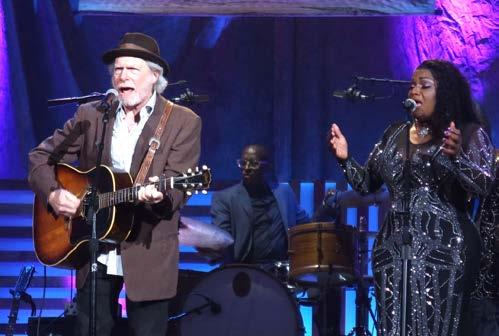
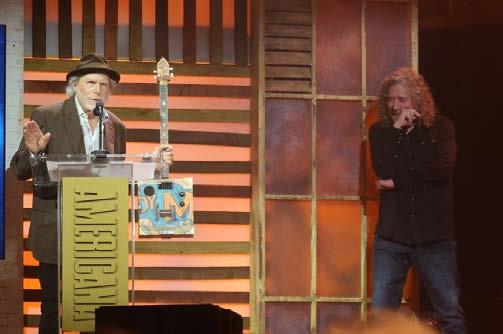
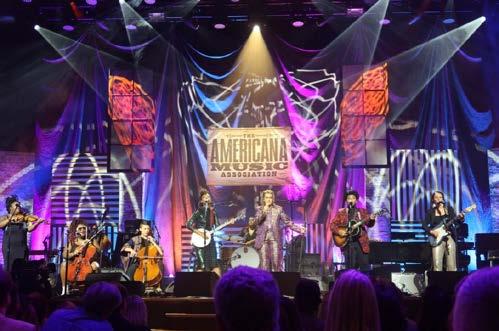
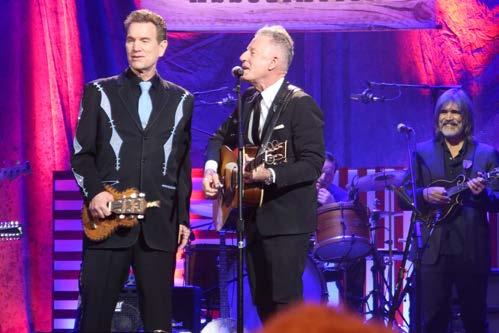
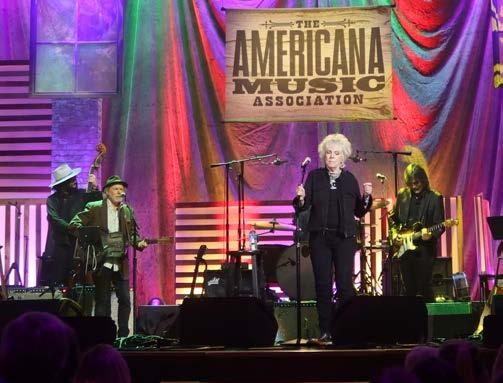
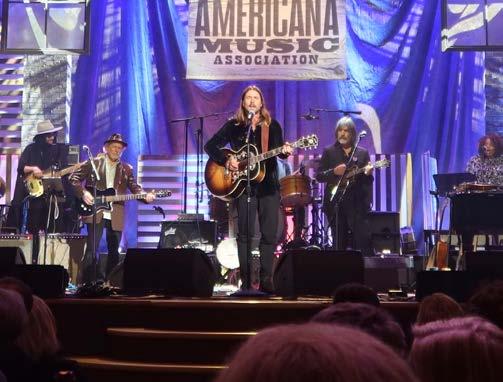
The multi-leveled diversity of the Americana music community is unparalleled in any other genre, and this year’s show shone a broad spotlight on that very unique quality.
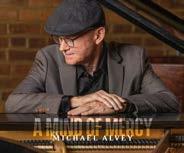
This album is a beautiful example of good intent put to music, with uplifting results. Michael Alvey is an excellent pianist, educator, and composer. Inspired by John Coltrane’s A Love Supreme, Alvey’s extended instrumental suite for piano trio, A Mind of Mercy, has five movements, each representing a different emotion or feeling. The record features Jim Ferguson on bass and Michael’s son John Alvey on drums, and the chemistry between the trio is immediate and continues throughout the record.
Part I “A Mind of Mercy (Conception)” opens with gentle solo piano, slowly opening up and setting a mood of contemplation and peace. Drums and bass enter gently, swimming around the mellow piano ostinato. The drums rise and solo against the piano and bass before dissolving into a soft Latin groove. Ferguson solos beautifully in the high register, and the piano brings it all back around.
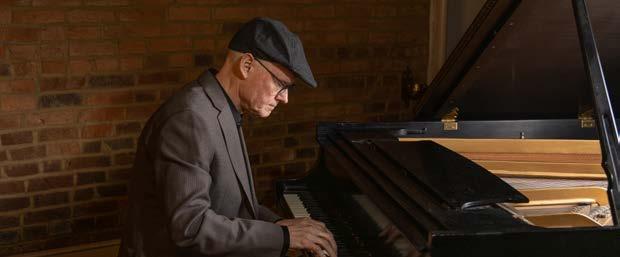
Part II “Soul of the Son (Incarnation)” has a Ramsey Lewis meets Bill Evansesque feel, and the space between the notes and the way the trio dances around each other is marvelous and inspiring. The descending coda is gorgeous.
Part III “Dance of the Paraclete” Is a powerful piano-driven samba and appropriately expresses joy. That emotion certainly comes through, and the dynamic between father and son is exciting to hear. John Alvey has a way of making the music feel good and swings at any volume, and Ferguson’s nimble bass solo is spot on. Their combined taste and sensitivity are the perfect foil for Alvey’s expressive piano.
Part IV “Undoer of Knots (Motherhood)” Alvey’s elegant and slightly Celtic solo piano melts into an elegant, peaceful ensemble arrangement that ebbs and flows beautifully.
Part V “Gratitude Blues,” is just that – an acknowledgement of life’s blessings. Alvey plays some sweet gospel influenced changes at the top and suddenly Ferguson’s sliding, slippery bass points the way to New Orleans and the band is swinging their way south. Alvey’s intense piano solo combines many techniques and elements into a seamless whole, and Ferguson and Alvey do a dual bass/drum solo section followed by the melody that takes it all the way back home.
The album was recorded and mixed by 257 member Brendan Harkin at his Wildwood Studio, and the sounds are intimate and excellent. In this day and age, it is simply refreshing and uplifting to feel the positive energy that went into this recording. In the liner notes, Alvey explains the concept behind the album, eloquently stating, “With a grateful heart, it is my sincere desire that sounds and spirit of the music in this album bring you great joy and peace.” Mission accomplished.
— Roy Montana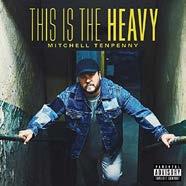
This aptly titled 20-song album is certainly a large listening experience. Mitchell Tenpenny is a Nashville native with a big, versatile voice that can go from country to pop and back, and cuts through a sonic landscape of shifting instrumental textures, courtesy of many of Music City’s finest musicians, engineers, and programmers. Among the many Local 257 members who appear on the record include Tim Galloway, Todd Lombardo, and Ilya Toshinskiy on acoustic guitars and various stringed instruments, Derek Wells and Rob McNelley on electric guitars, and Justin Schipper on dobro, slide, and steel. Alex Wright played a multitude of keyboards, and the rhythm sections include Tony Lucido and Jimmie Lee Sloas on bass, and Myles McPherson and Nir Z on drums.
The live sounds and programmed parts are blended together seamlessly, and the mixes keep the listener engaged with lots of dynamics and cool sounds. Tenpenny cowrote every song, and also coproduced all but one of the songs. He has a knack for creating chorus hooks and story lines that sound new, yet familiar, at the same time. There is a dark edge to some of the lyrics but the overall vibe is upbeat, with a few slower tunes for a change of pace. A couple of the songs have hooks that warrant the Parental Advisory sticker on the front cover, so parents, be forewarned.
The arrangements unfold unexpectedly from song to song, with modern country blended with thunderous drums, retro keyboards and big guitars. Echoes of classic and alt rock, techno and grunge are freely mixed with pop, hip hop, rootsy sounds and more. This approach could be thought of as formula, but the ingredients keep changing, and pull the listener along for the ride. The instrumental title track is less than a minute long and sounds as if it could be from a U2 record. “Cry Baby” combines banjos, boy-band style vocals and classic rock twin guitars into one song and it works. “Miss You” has a very clever hook, and a nod to Otis Redding’s “Dock of the Bay” whistle on the fadeout. “Losers” pays tribute to a certain Music Row bar, and “On Still Thinking About You,” acoustic guitars set a mood at the top with loops and vocal effects leading up to a tight chanting chorus, big guitar solo, breakdown, and big finish. “Long As You Let Me” could be straight out of the 90s, plus subtle autotune effects, with Tenpenny’s voice being the glue that holds it all together.
The album closes with “That How She Goes,” with a soaring verse melody that melts into a droning multitracked chorus reminiscent of a country Michael Jackson, and closes with a plea for the lost one to come home. If you have an open mind as to what is “country” these days, this record touches a lot of bases, and is certainly an interesting and unpredictable musical journey.
— Roy Montana TNM BY MELINDA WHITLEY
BY MELINDA WHITLEY

I write my first Symphony Notes column, I’d like to extend my thanks to Kevin Jablonski, who has served as the Nashville Symphony Union Steward since 2019. He has set the bar incredibly high, and I’m sure it will take me quite a while to discover all the ways we will miss his excellent work. Kevin served in a variety of symphony leadership positions over the last few years, and was shop steward during the tense time of our 18 months away from the stage that began with the pandemic in March 2020. His leadership culminated last season with Kevin completing the triple crown of symphony musician leadership, taking on the additional duties of Orchestra Committee Co-Chair and as a member of the Negotiating Committee, both very large time commitments. Luckily, Kevin is still a colleague in our incredible bass section and I’ll continue to work with him every day while seeking his advice as I try to fill his shoes.
Since I’m giving a nod to our internal leadership, this might be a good opportunity to pull back the proverbial curtain and share how extensively the Musicians of the Nashville Symphony (MOTNS) are organized. Within the city of Nashville, I don’t know of any other type of music performance work that maintains this much opportunity for input by the musicians with their employer regarding working conditions and the direction of the organization. What the organization chooses to hear is not up to us, but we take the opportunity seriously. In this regard, The Musicians of the Nashville Symphony are just like other unionized professional symphony orchestras across the nation.
Every spring we hold an election to fill positions on the Orchestra Committee, a group of seven players who serve on behalf of all musicians onstage as liaisons to our management and board of directors. Five members serve alternating two-year terms and two members serve alternating four-year terms. The reason being we don’t want to turn over an entire committee all at once and lose our continuity of leadership! The two four-year terms are occupied by the musicians who serve as the union steward and the delegate to ICSOM, the International Conference of Symphony and Opera Musicians, just one of the players’ conferences within the AFM.
As per our collective bargaining agreement, the musicians both elect and appoint other colleagues to serve on various internal committees that interface with the management, staff, and the board of directors of the Association. Such committees give musicians a large degree of input and a place at the table where decisions are
made. Association operational committees include: artistic planning, travel, and insurance. Standing committees on the board of directors include: executive, governance, strategic planning, marketing, development, external affairs, finance, education, Equity Diversity Inclusion & Belonging (EDIB), Symphony Center, and a joint oversight committee dedicated to our new Community Week outreach activities.
In addition to those contractual committees, the MOTNS maintain our own structural committees since we also function separately from the Association as a 501(c)5 labor organization. These committees are overseen by the Orchestra Committee with musicians serving as treasurer, and on committees for our newsletter, kitchen, wellness, website, public relations/social media, and a sunshine committee that focuses attention on supporting each other in whatever emergency needs a musician might have in the moment, such as when a musician or their family has a baby or a surgery.
The orchestra committee meets regularly with upper management to discuss work rules and issues like lighting and audio, in addition to how rehearsals and concerts are scheduled. I often wonder if our guest artists and their technical crews have been briefed that our union musicians have helped create the boundaries for things like decibel levels and light usage. As a union workplace, we adhere strictly to the clock for how time is used for rehearsals, concerts, overtime, and break schedules. We even have special clocks, both onstage and backstage, that run backwards like a timer, counting down our time until a break is over!
Article 1 of our contract states “The Association…recognizes a Union Steward and a committee of musicians…(referred to as “Orchestra Committee”) who shall assist the Union in the negotiation, enforcement and administration of this Agreement.” The same article also states that we should be free of recrimination or harassment for our activities on behalf of the Orchestra Committee or Union and that we have the right to meet as needed to discuss with the Association, it’s representative, and the Music Director in all matters covered by the Agreement. If you’ve ever had a job where you had no say in what happened at that job, you might recognize how fortunate we are to have the voice and the relationship we have developed with our employer, because of the safety net that comes from a union contract.
Now that you’ve seen behind the curtain, we hope our colleagues and guests who join us on and off the stage will feel more comfortable knowing how we work as our own team at the symphony, thus allowing us all to relax and perform at our best.
“We hope our colleagues and guests who join us on and off the stage will feel more comfortable knowing how we work as our own team at the symphony.”
itting at the computer at the end of August, it’s hard to believe it’s fall again. Football is back, school is taking over the family schedule again, people are making their last choices to enjoy outdoor music, and I just read in the New York Times that legendary jazz producer Creed Taylor died at the age of 93. Nashville musicians don’t need to be told how important the producer is. For the millionth time we’ve all played “Girl from Ipanema” at a wedding gig, to the times we played a John Coltrane tune at a jam session, to the George Benson and Wes Montgomery grooves we all worked the bars with, let’s say a quiet thank you to Mr. Taylor.
The Wright School of Music at Middle Tennessee State University in Murfreesboro started its annual Jazz Artist Series in September, with additional concerts to come in February and April 2023. Watch for a faculty recital by superb saxophonist Don Aliquo Oct. 20 and a concert by the MTSU Salsa Band led by Lalo Davila Nov. 29. Both events are at 8 p.m. in Hinton Hall. Most concerts are livestreamed and archived for 30 days at www.mtsu.edu.
Belmont University’s jazz choir Jazzmin sings in Massey Hall on the campus at 6 p.m. Oct. 29. Concerts are livestreamed and archived at www.belmont.edu. Vanderbilt’s Blair School of Music presents their Jazz Choir a week later at 8 p.m. Nov. 9 in Turner Hall on campus. Then, on Nov. 13, eloquent pianist Bruce Dudley takes the Turner Hall stage at 8 p.m. Blair concerts are livestreamed at www.blair.vanderbilt.edu.
Fall means it’s time again for Jazzmania, the annual fundraiser supporting the Nashville Jazz Workshop. Celebrate this event’s inperson return to Liberty Hall at the Factory in Franklin with the NJW All-Stars, the Mid-Town Jazz Quartet, and the Young Artists Ensemble plus Latin-jazz artist Giovanni Rodriguez and 12 Manos. There will be live and silent auctions and lots more. It’s all happening Oct. 22 at 7 p.m. www.nashvillejazz.org
If you like your jazz in the easy-listening vein, Schermerhorn Symphony Center offers the umpteenth Frank Sinatra wannabe, Tony DeSare, who presents “Sinatra and Beyond” on Nov. 10 at 7 p.m. and Oct. 11 and 12 at 8 p.m. The mood continues on Nov. 29 and 30 with popular trumpeter Chris Botti at 7:30 p.m. Information at www. schermerhorn.org. If you prefer dining with your jazz, go to the City Winery Oct. 21 for sophisticated vocalist Madeline Peyroux at 8 p.m.; then stay for some retro-swing with the Squirrel Nut Zippers on Oct. 25 at 8 p.m. Come back on Dec. 8 for a Kat Edmundson Christmas in

the lounge at 7 p.m. Want a preview of this real live Tinker Bell vocalist? Check out The Kat Edmundson Show every Sunday night from her living room, livestreamed at 7 p.m. EDT. For info go to www.citywinery.com
 BY AUSTIN BEALMEAR
BY AUSTIN BEALMEAR
Remember the 1980s fashion for new-age jazz courtesy of Windham Hill Records? One of the label’s most popular artists, George Winston, is still touring with his signature solo piano style and appears at the Franklin Theatre Nov. 17 at 8 p.m. Come back for the holidays and enjoy the classic Glenn Miller Orchestra on Dec. 2 at 8 p.m. The Lori Mechem Quartet remembers another classic with a “Tribute to A Charlie Brown Christmas” Dec. 4 at 7 p.m. Information at www. franklintheatre.com
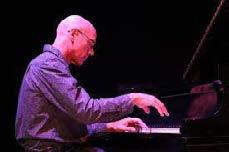
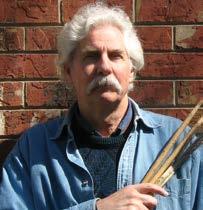
What’s new?
How about a way to promote your gigs to a larger audience? Try Jazz Near You — a concert discovery platform that promotes live jazz, facilitates ticket sales and unites jazz communities in 300 cities worldwide. Each city calendar includes local events and all streamed events regardless of regional location. Sponsored by www.allaboutjazz.com.
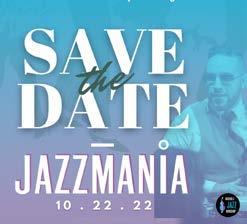
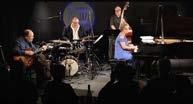
How about a bowling alley, in the heart of downtown, that is also a major high-tech concert venue? Brooklyn Bowl is a multiple-party space concept that has been successful in other cities. On Dec. 11 at 8 p.m. they present jazz guitarist Julian Lage with his trio, in support of their new Blue Note album, View with a Room Lage was a child music prodigy, got introduced to the jazz audience by Gary Burton, and is the recipient of several Grammy nominations. For information go to www.brooklynbowl.com

How about a hip concert venue deep in Duck River country? Molly’s Place at 407 W. Public Square in Centerville is two blocks from the Minnie Pearl Statue, but features jazz and blues weeknights every week. The 11th season of special concerts called Jazz@Molly’s started in September. Go down at the right time and you can also catch the National Banana Pudding Festival. For information, call 931-994-2013 or try www.molly.bar/events.
See you out there. Bring your spoon.
Fall means it’s time again for Jazzmania.
April 23, 1938 — April 1, 2022
Beloved mandolinist and singer Roland White, 83, died April 1, 2022. He was a member of the innovative ‘60s band first known as the Country Boys and later the Kentucky Colonels — a group that was instrumental in the reinvention of bluegrass that would come to be known as newgrass. The inventive take on the genre drew the attention of the Byrds and other prominent West Coast bands of the era. White was a 55-year member of the Nashville Musicians Association who joined Local 257 June 2, 1967.
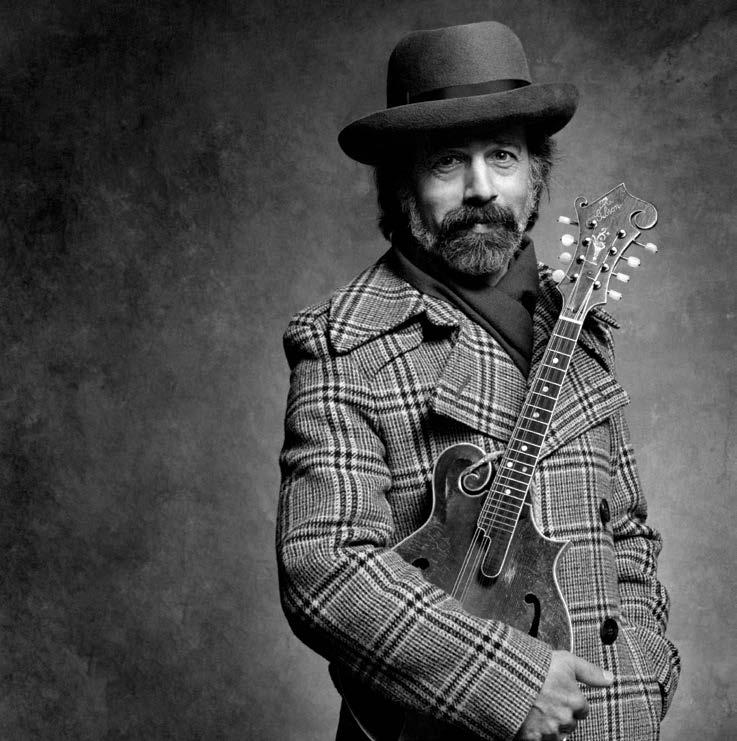
White was born on April 23, 1938, in Madawaska, Maine, to Eric and Mildred Cyr White, the oldest of five children. The family moved to California in 1954. His father was a carpenter who played guitar, tenor banjo, and harmonica. Roland started playing mandolin at the age of six, and the siblings performed together as a band for area functions.
In an interview White remembered his dad introducing him to mandolin. “One day I came home from school and he had a mandolin and he was playing “Ragtime Annie,” then he played “Soldier’s Joy.” I said, ‘What is that instrument?’ And he said, ‘The mandolin.’ He played another tune and then he handed it to me and said, ‘Here!’ Never gave me a lesson or anything and I just started playing it. That was my first instrument—and it was mine. It was an old one with the round bottom, we called them tater bugs. That was the first mandolin I had,” White said.
In 1957 the group won a KXLA radio contest, and also attracted the attention of Joe Maphis, which led to multiple appearances on local TV shows. White and his brother Clarence, a consummate flat-top player, anchored a group they called The Country Boys. Following Roland’s return from military service, the renamed Kentucky Colonels released Appalachian Swing, a play on Aaron Copeland’s Appalachian Spring. The critically acclaimed album, which contained striking innovations that included Clarence’s stunning lead guitar work, was recorded in one session with no overdubs, and the band became known as one of the best bluegrass groups in the country.
In 1967 White made a return to more traditional bluegrass groups, as he first joined his childhood idol Bill Monroe’s Bluegrass Boys, and then in 1969 began a stint with Lester Flatt as a member of Nashville Grass. He rejoined Clarence to form the New Kentucky Colonels in 1973, but the reunion was tragically cut short when his brother was killed by a passing automobile. Roland was also injured in the accident, suffering a dislocated shoulder. Three years later he released the wellreceived traditional bluegrass solo album I Wasn’t Born to Rock & Roll…But I Love to Cook. He would go on to play with the progressive Country Gazette for 13 years, and then the Nashville Bluegrass Band. In 2000 he formed the Roland White Band, in which he performed with his wife, Diane Bouska on guitar, until his passing. The band’s 2000 album Jelly on My Tofu was nominated for a Grammy.
In addition to the dozens of releases he played on as a member of several bluegrass bands, he has contributed mandolin to a plethora of recordings for other artists from Marty Stuart and Doc Watson to the Dreadful Snakes, Glen Duncan, Buck White, Ry Cooder, and Ricky Skaggs. He collaborated with Jim Lauderdale on an eponymously titled 1979 album, and released three additional solo albums in 1994, 2003, and 2018. He also gave workshops, taught private lessons, and authored books and instructional CDs.
Marty Stuart, who also played with Lester Flatt before embarking on a solo career, said he considered White to be a mentor. “I owe my entire career to Roland White. He encouraged young musicians to look deep into their hearts and play what they hear inside,” Stuart said.
In 2017 White was inducted into the International Bluegrass Music Association’s Hall of Fame. An autobiography of White by Bob Block entitled Mandolin Man was released in 2022.
Survivors include his wife, Diane Bouska; one daughter, Roline Hodge; one son, Lawrence LeBlanc; one sister, Rose Marie Johnson; two grandchildren; and one great-granddaughter.
A celebration of life was held May 22 at the Station Inn in Nashville.
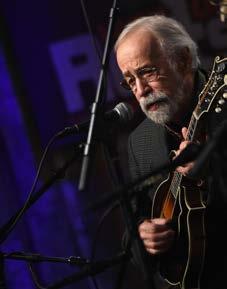
“I owe my entire career to Roland White. He encouraged young musicians to look deep into their hearts and play what they hear inside.”
— Marty Stuart
April 28, 1927 — May 26, 2022
Producer, arranger, music director and keyboardist William Alfred “Bill” Walker, 95, died May 26, 2022. Over the course of his long and storied career, he accumulated a stunning list of production credits for hit records with Eddy Arnold and a host of other artists. He was also the musical director on a vast array of television programs, including the Johnny Cash Show, 15 years of CMA Award shows, and many more. He was a 57-year life member of the Nashville Musicians Association who joined Local 257 Aug. 6, 1964.
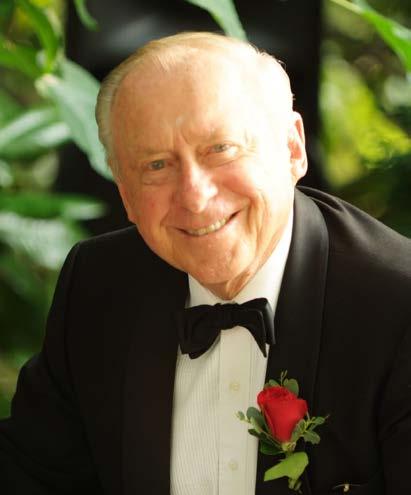
The Sydney, Australia, native was born April 28, 1927, into a musical family. His father played harmonica, and his mother was a singer. The family owned a dairy farm and Walker said in an interview he had to milk 20 cows every morning and afternoon. He quickly followed in the family musical tradition, and was playing piano by the age of five. After high school he worked a variety of jobs — including playing in local nightclubs and writing arrangements for local dance bands — to earn tuition to attend college. He went on to earn a degree in music at the Sydney University Conservatorium of Music, and then to work for RCA in Johannesburg, South Africa, where he arranged 23 albums containing cover versions of popular American songs. In 1962 Walker produced a record for Jim Reeves, who was already a star in South Africa. The record went gold in Europe, and in 1963 Reeves enlisted Walker to become musical director for a planned television show he was slated to host. The NBC project was to compete with an ABC series starring Jimmy Dean. Walker moved to the U.S. in 1964 just in time to hear the news of Reeves’ fatal plane crash. He said in an interview that the first thing he did in Nashville was attend Reeves’ funeral.
He decided to stay anyway, applied for citizenship, and played around town at various gigs for a few months before drawing the attention of RCA artist Eddy Arnold, who enlisted Walker to arrange an album of country songs,
“I met Mr. Walker in 1964 and for the next many decades was privileged to work for and with him in many capacities. His support and loyalty, his generosity and his ready smile, got us through gigs of all kinds. In addition to enjoying the musical ride, I learned much about work ethic, loyalty and commitment from Bill, a real gift.” — George Tidwell
which included the huge hit “Make the World Go Away.” The track gave Walker his first No. 1 gold record, and launched his Nashville career.
Walker would go on to work with Chet Atkins, Johnny Cash, Loretta Lynn, Crystal Gayle, the Statler Brothers, Tennessee Ernie Ford, and many more. His gold records continued to accumulate, and included “Turn the World Around,” “Misty Blue,” and “What’s He Doing in my World” for Eddy Arnold, Sammi Smith’s “Help Me Make It Through the Night,” “My Woman, My Woman, My Wife” for Marty Robbins, “Sunday Morning Coming Down” for Johnny Cash, and Donna Fargo’s “The Happiest Girl in the Whole U.S.A.” as well as many others.
In addition to his role as the highly-valued musical director on the Johnny Cash Show — Cash ended every show by saying “Goodnight, Bill Walker!” — and the long tenure on CMA Awards shows, he worked on programs such as Perry Como and His Nashville Friends, Nashville Remembers Elvis, Grand Ole Opry at 50, Opryland in Russia, A Celebration of Country Music at Ford’s Theater, and a host of other productions. Over his career Walker arranged and conducted music on shows attended by three different American presidents.
Woodwind player and MTSU professor emeritus John Duke was part of the house band for the Johnny Cash Show, and worked with Walker on many other dates as well.
“I’ll never forget Bill Walker. He played a huge role in my career in Nashville. I remember hiring him when he first came to Nashville under trying circumstance. I remember his beautiful Brentwood wedding to Jeanine. I remember his providing me an introduction to country music on such shows as the CMA Awards shows, Eddy Arnold, Elvis, Johnny Cash and others. I remember well his telling Bobby Moore to hire me for the Johnny Cash TV Series. I remember his great job as conductor of the Cash show. I remember his sense of humor and his smiling face no matter what the circumstances. I was so sorry to not be able to attend his funeral, but I’ll remember Bill Walker for the rest of my life. Rest in Peace, old friend, and condolences to Jeanine and the rest of his family,” Duke said.
Walker also worked as a producer for Capitol records, helming projects for Roy Rogers, Wanda Jackson, Ferlin Husky, and others. He was regularly a guest conductor for many symphonies, including those in Nashville, Dallas, Atlanta, Memphis, Tampa, and Boston. A friend of film composer John Williams, Walker sometimes sat in with Boston Pops Orchestra, and also wrote arrangements for the orchestra.
In the late ‘70s Walker ran his own indie label, Con Brio Records. In the ‘80s and ‘90s he worked extensively with The Nashville Network, including seven years as producer of The Statler Brothers Show
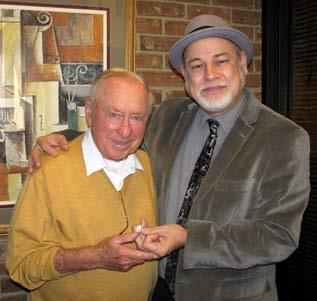
continued from page 29
He also worked on film scoring for movies starring Kirk Douglas, Robert Mitchum and Gregory Peck, among others. Walker continued to record in the 2000s, and released four gospel albums with his wife Jeanine.
Trumpet player George Tidwell talked about his friendship with Walker.
“I met Mr. Walker within a few weeks of his arrival in Nashville, in 1964, from Australia via South Africa, and for the next many decades was privileged to work for and with him in many capacities. I was his trumpet player, copyist, contractor, and best of all his friend. His support and loyalty, his generosity and his ready smile, got us through gigs of all kinds, from Joni Mitchell to balloon animal makers, and he treated all with equal respect and concern. In addition to enjoying the musical ride, I learned much about work ethic, loyalty and commitment from Bill, a real gift. So, rest well my friend, and I’ll add, not goodbye, but one last ‘Goodnight, Bill Walker!’, with thanks and love,” Tidwell said.
Walker was preceded in death by two sons, Jeff and Peter Walker; and one daughter, Lisa Gibson. Survivors include his wife, Jeanine Ogletree Walker; one daughter, Beth Walker; one son, Colin Walker; one sister, Julianne Smith; one brother, Robert Walker; 13 grandchildren; and 21 greatgrandchildren.
Funeral services were conducted June 2, 2022, at First Baptist Church in Nashville, with interment at Williamson Memorial Gardens in Franklin, Tennessee.
July 14, 1951 – March 30, 2022
Bassist, tuba player, and educator Isham “Ike” Harris III, 70, died March 30, 2022. He was a 50-year life member of the Nashville Musicians Association who joined Local 257 May 5, 1971.
Harris was born July 14, 1951, to Isham
A. Harris Jr. and Ruth Eleanor Poole Harris. He attended Maplewood Comp High School and John Overton Comp High School in Nashville, and went on to graduate from Austin Peay University, where he would return to teach. He also taught at other area colleges and universities including Belmont, David Lipscomb, and MTSU. In the course of his musical career he performed at Opryland theme park, on the park’s General Jackson showboat, and worked with
many artists including Danny Davis, Boots Randolph, Crystal Gayle, Chet Atkins, as well as a variety of other jazz and orchestral ensembles. He was a longtime member of the touring jazz group Titan Hot Seven.
Harris’s studio credits include work on Montana Cafe for Hank Williams Jr. and a Christmas release for Danny Davis, as well as several albums for children and teens. He played on the record Tubalogy 601 as part of the Tennessee Tech Tuba Ensemble.
Harris was lauded by family members as a gentleman as well as a great musician, a mentor to many young musicians, and a humble person admired by all who knew him.
Fellow bassist Jim Ferguson spoke of his long friendship with Harris.
“I knew Ike Harris for the better part of the last 40 years. He was a very active bassist and low brass player and was highly sought after in the traditional jazz, small group modern jazz, and big band genres. He was a regular client of my part-time bass repair shop, so I got to reconnect with him most often through those interactions. He had a reputation for taking care of business
as a bassist, and being easy going and soft spoken on the bandstand. He’ll be greatly missed by his bass clef pals and by all who knew him,” Ferguson said.
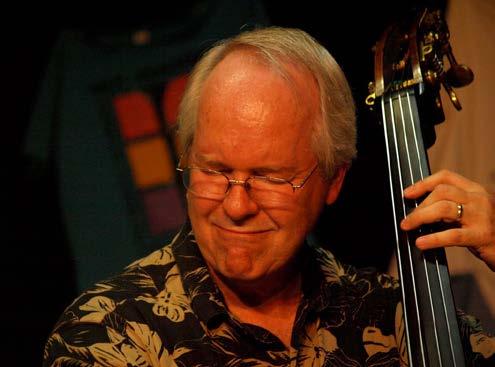
In addition to his parents, Harris was preceded in death by one sister, Judy Harris Caples. Survivors include his wife of 46 years, Mina, one son, Brad Harris; one daughter, Stephanie Harris Daniel; and one grandchild.
A memorial service was held April 23 at Immanuel Baptist Church in Nashville. The family has requested that donations in Harris’ name be made to the Alzheimer’s Association.
Jan. 18, 1937 – March 28, 2022
Singer, songwriter, and guitarist Gerald “Jerry” Dean Collins, 85, died March 28, 2022. He was a life member of the Nashville Musicians Association who joined Local 257 Oct. 6, 1964.
Collins was born Jan. 18, 1937, in Bertrand, Missouri, to Garvin and Ida Mae Webb Collins. His parents and grandparents all played music, and plenty of instruments around the house led to Jerry picking up mandolin — because he
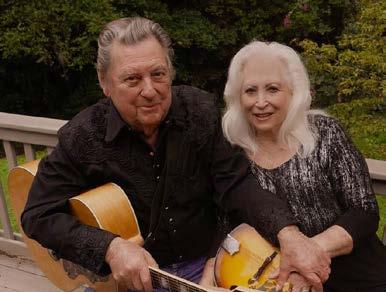
“He had a reputation for taking care of business as a bassist, and being easy going and soft spoken on the bandstand. He’ll be greatly missed by his bass clef pals and by all who knew him.”
— Jim FergusonIke Harris
could reach around the neck — at the age of five. Within a few years he and his brother were playing in the area.
After a move to Miami, Florida, the 16-year-old Collins, now playing guitar, got an underage waiver to perform in nightclubs. He cites his brother as a musical mentor, as well as Ferlin Husky. He went on in later years to play with Husky on the road, as well as with Wilma and Stoney Cooper. He and his wife Gwen performed as a duo, and played a variety of venues as part of the Husky road show. They also made regular appearances on the Wheeling Jamboree in Wheeling, West Virginia. The duo recorded in Nashville and had notable singles with Capitol Records in the late ‘60s through 1970, including a cover of “Get Together” and a soulful ode to cheating called “We’re Not Bad.”
In the following decades Collins continued to write and perform, and saw chart success in Europe as well as North America. He released a number of solo projects including Jerry Collins and Friends, and was known for his support and encouragement of other writers and artists. He married his wife, Virginia, who is also a singer and songwriter, in 2021.
Collins was preceded in death by his parents, wives Gwen and Charlotte; and one brother, Garvin J. Collins. Survivors include his wife, Virginia Collins; one daughter, Cheryl Klercker; one stepdaughter, Kim Townsend, two stepsons, Kyle Rogers and Jeff Norris; and three grandchildren.
Funeral services were held April 1, 2022, in the chapel of Boyd Funeral Home in Ashland City, Tennessee, with interment following at Ever Rest of Cheatham Cemetery in Pleasant View, Tennessee. Joe Vick and Max Vick officiated.
Jan. 19, 1951 – April 23, 2022
Multi-instrumentalist David Ray Robbins, 71, died April 23, 2022. He was a 31-year member of the Nashville Musicians Association who joined Local 257 July 10, 1991.
He was born Jan. 19, 1951, in San Mateo, California, to Ray and Judy Robbins. He was always drawn to music — his first toys were cars and guitars. He began to play steel when he was six, and was inspired to master the instrument after hearing Buddy Emmons play “Sunday in Dixie.” He didn’t lose his taste for cars either — acquiring a 1956 Chevy as his first.
While growing up Robbins played in the family band and after high school graduation, he joined a traveling gospel band based in the Southeast. He recorded with the group as well, and soon was playing on his first Nashville session. Robbins went on to play with Dottie West and Jean Shepard, and made many appearances on the Grand Ole Opry
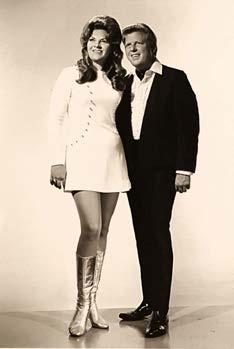
In the ‘80s Robbins founded a band in Northern California called The Midnight Riders. Eventually he would open a steel guitar repair shop in Tennessee, and kept playing in his father’s band right up until his passing. Family members remember a quote from Robbins that summarized his playing philosophy: “It’s not how many notes you play, or how fast you play them, but how well they’re played.”
Cars remained a hobby for Robbins, who enjoyed working on them, and watching races. In 2007 he became a Church of God minister. He was remembered as a devoted family man who had a significant impact on those around him through love, friendship, mentorship, spiritual teaching, or humor.
Robbins was preceded in death by one son, Sean; and his mother, Judy. Survivors include one daughter, Jennifer Mask; his father, Ray Robbins; one brother, Gary Robbins; one sister, Donna Mizer; several other family members; and beloved friend Loren Nelson.
A celebration of life with remembrances and live music was held June 11 at the American Legion Hall in Tracy, California. Please reach out to the family directly for information on memorial donations.
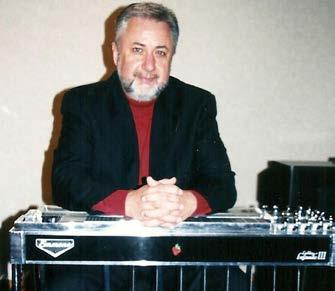
Jan. 26, 1944 – June 13, 2022
Guitarist Alan Cassaro, aka Alan Leatherwood, 78, died June 13, 2022. He was a life member of the Nashville Musicians Association who joined Local 257 April 30, 1974.
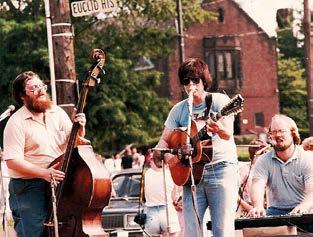
He was born Jan. 26, 1944, and began his recording career in 1962 with a release called “Hickory Dickory Dock” on Honolulu label Mahalo Records. He was a versatile musician who played a variety of genres including rockabilly, pop, rock and folk. After releasing several more singles under his name as well as the name Lane Cassaro, he formed a duo that played in the Cleveland folk scene in the mid to late ‘60s. He and his singing partner — known as Leatherwood and Lisa — performed at local folk venues, and eventually toured across the country at festivals and performance clubs. They were spotted by Marty Robbins, who signed them to a production deal and brought them to Nashville. Cassaro performed on the Grand Ole Opry, and the duo also appeared in Country Music, a movie that starred Robbins, singing an original song — “My Kind of Free” recorded for the film at the Ryman Auditorium in 1972. The YouTube video also features a very young, dark-haired Ralph Emory.
32
The duo recorded several singles but ultimately disbanded, and Cassaro returned to Cleveland, where he continued to perform, write, and record albums in his studio. He firmly believed that writers should own their own music, and formed his own publishing company, House of Leatherwood. Over the course of his 60-year career, he wrote hundreds of songs, and released six CDs, two albums on vinyl and several singles. Cassaro was known as a mentor to many local singer-songwriters. He was considered a scholar on the history and sociology of roots music, acting as a consultant for a class on the subject taught at Case Western Reserve University in Cleveland.
Survivors include his wife, Clara.
A concert honoring the memory of Cassaro entitled “Rise Up with Me: A Tribute to the Life and Music of Alan Leatherwood (Al Cassaro)” was held Aug. 21 at the Beachland Tavern in Cleveland. Performers played Cassaro songs, and songs fellow writers said he influenced. Those playing included Paul Penfield, Alexis Antes, Jim Schafer, Robin Stratton, David Budin, Noah Budin, Kevin Richards, Ken Metz, Danny Dickerson, and others.
Jan. 2, 1954 – May 20, 1922
Bassist and guitarist William Lee Witt, age 68, died May 20, 2022. He was a life member of the Nashville Musicians Association who joined Local 257 Feb. 1, 1971.
Witt was born Jan. 2, 1954, to Robert F. and Barbara Bryant Witt in Davidson County. He was a truck driver for Federal Express and a member of the Baptist church.
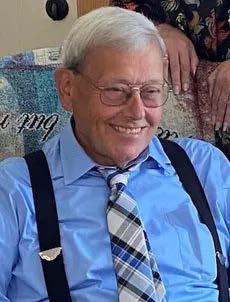
He was preceded in death by his parents; one brother, Robert B. Witt; and one sister, Ann Elizabeth Hammer. Survivors include two daughters, Ashley Lea Witt and Amada Evelyn Witt; one sister, Amy Witt Smith; one grandchild; and a host of nieces, nephews, and cousins.
A funeral service was held May 27 in High’s Chapel with David Hale officiating. Burial followed in the Gath Cemetery. A Masonic service was also held May 26 in High’s Parlor by Sam Davis Lodge #661 Free & Accepted Masons, Smyrna, Tennessee.
Memorial contributions may be made to Methodist Transplant Institute, 1211 Union Ave., Suite 340, Memphis, TN, 38104.
The officers, staff and members of Local 257 extend our deepest sympathies to the families and friends of our members who have recently passed away. You are in our thoughts, hearts and prayers.
May 6, 1935 – March 7, 2022
Nashville Musicians Association life member Marvin Lanier, 86, died March 7, 2022. He was a guitarist who joined Local 257 Jan. 18, 1975.
Lanier was born May 6, 1935. He was bandleader for Don Gibson for many years and made appearances on many television and radio programs including multiple performances on the Grand Ole Opry. Following his work with Gibson, Lanier lived in the Charleston, South Carolina, area, where he continued to perform and teach guitar. He was inducted into Charleston’s Lowcountry Music Hall of Fame in 2017. Hall of Fame founder Michael Davis called Lanier one of the area’s greatest guitarists.
Guitarist Earl Erb spoke warmly of his friendship with Lanier.
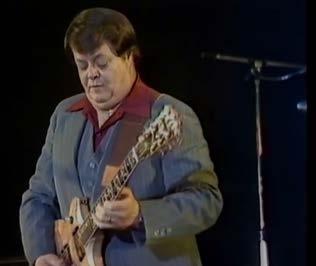
“Marvin was a friend for many years after we met in Nashville around 1970. He played guitar and was the band leader for Don Gibson for years. He had a distinct and soulful style of playing. He told me he had a ball working for Don. He was one of the nicest guys I’ve ever known,” Erb said.
Survivors include two daughters, Debbie Woolmer and Sondra Smith; one son, Chris Lanier; and several granchildren. There was no public funeral service.

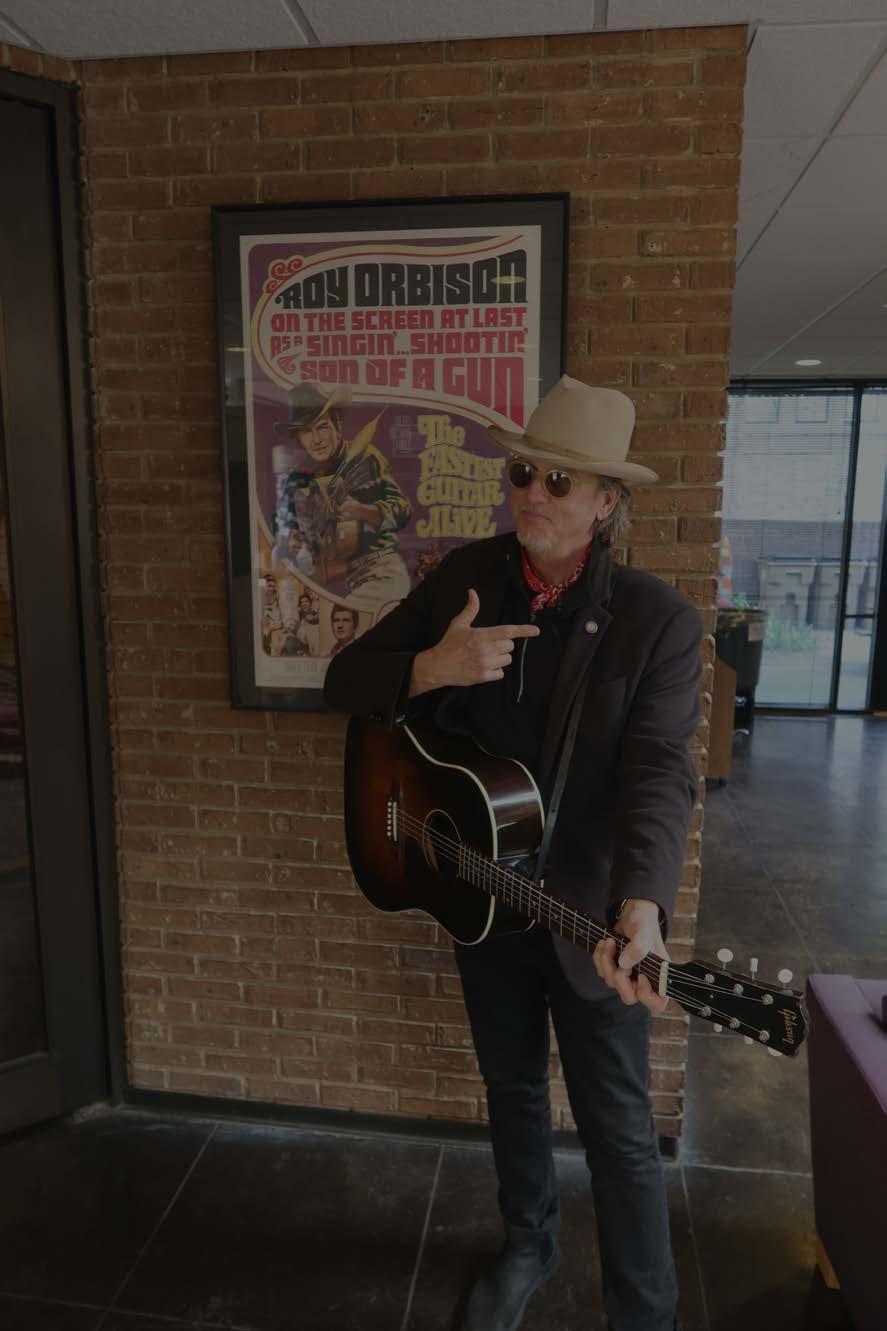

The “Do Not Work For” list exists to warn our members, other musicians and the general public about employers who, according to our records, owe players money and/or pension, have failed to sign the appropriate AFM signatory documents required to make the appropriate pension contribution, or are soliciting union members to do non-union work. When you work without the protection of an AFM contract, you are being denied all of your intellectual property rights, as well as pension and health care contributions.
Tommy Sims dba Positive Movement
Sims remains in violation of a 2012 court order to pay more than $300K owed to musicians since 2008. Sims has recently made two payments towards this debt.
Nashville Music Scoring/Alan Umstead – solicitation and contracting non-union scoring sessions for TV, film and video games. Musicians who work for them are being denied appropriate wages and all intellectual property rights.
Electronic Arts/Steve Schnur – commissioning and promoting non-union videogame sessions and exploiting musicians' intellectual property for his own gain.
These are employers who owe musicians money and have thus far refused to fulfill their contractual and ethical obligations to Local 257 musicians.
• Terry K. Johnson/ 1720 Entertainment (unpaid contracts/unauthorized sales –Jamie O’Neal project)
• Ed Sampson (producer) & Patrick Sampson (artist) (multiple unpaid contracts/ unauthorized sales)
• Revelator/Gregg Brown (multiple bounced checks/unpaid contracts)
• Beautiful Monkey/JAB Country/Josh Gracin
• Eric Legg & Tracey Legg (multiple unpaid contracts)
• Ray Vega/Casa Vega
• Quarterback/G Force/Doug Anderson
• Rust Records/Ken Cooper (unpaid contracts and pension)
• HonkyTone Records – Debbie Randle (multiple unpaid contracts/pension)
• Jeanette Porrazzo

• Mike Barrios (unpaid live performance wages)
UNPAID CONTRACTS AND PENSION
Knight Brothers/Harold, Dean, Danny & Curtis Knight
River County Band/SVC Entertainment
(unpaid demo conversion/pension)
UNPAID PENSION ONLY
Comsource Media/Tommy Holland
Conchita Leeflang/Chris Sevier
Ricky D. Cook
FJH Enterprises
Matthew Flinchum dba Resilient
Jeffrey Green/Cahernzcole House
Randy Hatchett
Missionary Music
Jason Morales (pension/demo signature)
OTB Publishing (pension/demo signature)
Tebey Ottoh
Ride N High Records
Jason Sturgeon Music
AFM NON-SIGNATORY
PHONO LIST
We do not have signatory paperwork from the following employers — pension may have been paid in some cases, but cannot be credited to the proper musicians without a signatory agreement in place. If you can provide us with current contact info for these people, we will make sure you get your proper pension contribution for your work.
604 Records
Heaven Productions
Stonebridge Station Entertainment
The Collective
WHAT DO LORETTA LYNN, CHESTER THOMPSON, KELSEA BALLERINI, PETER FRAMPTON, AND THE MUSICIANS OF THE NASHVILLE SYMPHONY HAVE IN

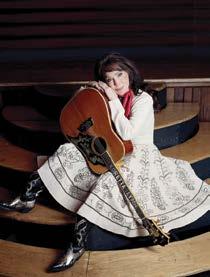
THEY ARE ALL MEMBERS OF THE NASHVILLE MUSICIANS ASSOCIATION AND READ THIS MAGAZINE! Advertising in The Nashville Musician is a cost–effective way to reach professional musicians, high-profile artists and music business executives.
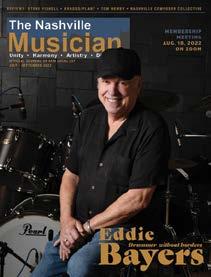
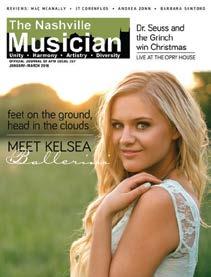
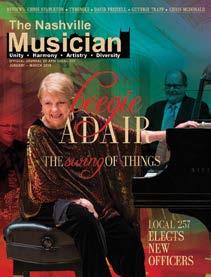
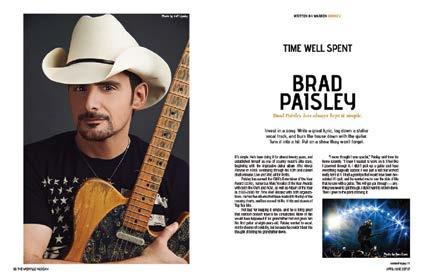
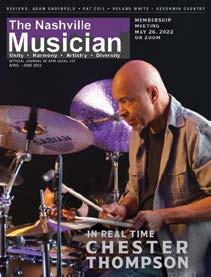
● Print circulation over 3000
● Interactive version free online at nashvillemusicians.org and
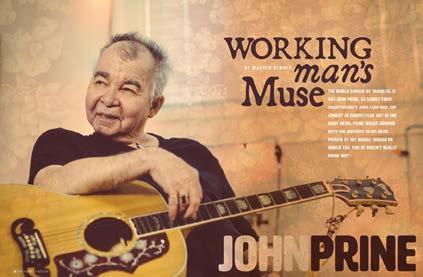
● Distributed at Summer NAMM each year to thousands of musicians
● Only Nashville publication that guarantees access to an exclusive demographic
● Great rates and online plus print packages available


